 13/12/2009 12:54 13/12/2009 12:54 |
|
| | | OFFLINE | | Post: 19.070
Post: 1.717 | Registrato il: 28/08/2005
Registrato il: 20/01/2009 | Administratore | Utente Veteran | |
|

 Benedict XVI is not 'anti-modern':
Benedict XVI is not 'anti-modern':
He has gone beyond modernity

December 10, 2009
It is worth turning back to Anglicanorum coetibus. Now that the frenzy has passed, is possible to reason calmly about the true weight of this Apostolic Constitution which will allow groups of Anglicans to return to Rome.
The distraction over the dispensation allowing married Anglican clergy to continue as such when they convert - which is not really new in the Catholic Church - and the ominous forebodings of those who 'fear' the entry into the Church of 'a horde of homophobic and misogynistic traditionalists' [since they oppose women priests and gay marriages] have obfuscated one of the most interesting aspects of the Constitution.
Personal ordinariates, which will allow the Anglicans to convert and maintain their own traditions, conform to the non-territorial juridical forms provided for by the Second Vatican Council to show that the Church is capable of adapting its organization to the demands of the times.
And that is a spirit that has impregnated the Pontificate of Benedict XVI.
This Pope is aware that when there is unity on the essentials - namely, the deposit of faith left by Christ to man - then it is possible to diverge on other things without fear of rupture. [An over-simplification, in the case of cafeteria Catholics who oppose all the life, family and marriage positions of the Church but cannot get themselves to leave the Church, nor to get together to create a 'schismatic' bloc, as the Lefebvrians did! No, they are much too lazy and 'comfortable' to get out of their self-dug rut within the Church, from which they can and do vent all their dissent with almost absolute impunity!]
Far from waging an 'anti-modernity crusade', as some quarters still accuse this Pope repeatedly, Joseph Ratzinger has gone beyond modernity quite a bit.
By showing that trust in truth is the response to the yearnings of contemporary man: it allows finding a common ground that keeps intact the characteristics and freedom of each and everyone.
How many other institutions, after 2000 years, would be that capable of adapting itself to the challenges of the times?
[Modificato da TERESA BENEDETTA 13/12/2009 14:33] |
| |
|
| |
 13/12/2009 14:19 13/12/2009 14:19 |
|
| | | OFFLINE | | Post: 19.071
Post: 1.718 | Registrato il: 28/08/2005
Registrato il: 20/01/2009 | Administratore | Utente Veteran | |
|
 Sunday, December 13
Sunday, December 13
III Sunday of Advent (Gaudete Sunday)
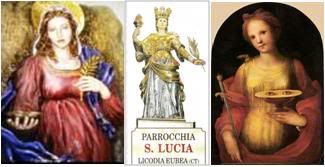 ST. LUCIA (Sicily, 83-304), Virgin and Martyr
ST. LUCIA (Sicily, 83-304), Virgin and Martyr
Born to a wealthy family, Lucy is said to have vowed herself to virginity,
refused to marry a man chosen by her family, and given away her dowry
to the poor. For her staunch defense of her faith in Christ against the
prevailing society of her day, she was executed during the Diocletian
persecution. Legend has it that her eyes were gouged out before she was
put to death, an event commemorated in her images and her veneration
as the patroness of eyesight. Although little historical fact is known about
her, she is venerated as a saint by all the Christian churches, and is one
of only seven women (including Mary) mentioned in the Canon of the Mass.
Lutherans in the Scandinavian countries have a particular devotion to her.
OR today.
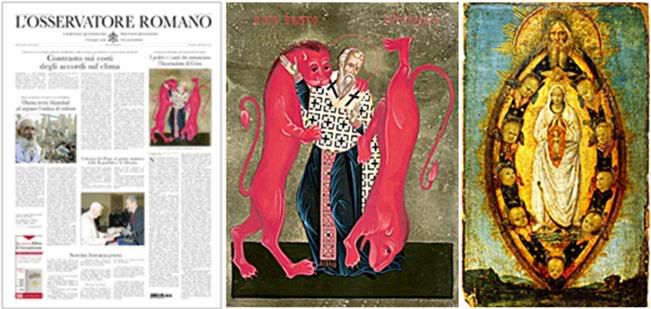 Illustrations: St. Ignatius of Antioch; Mary as the 'door to the King of history'.
Illustrations: St. Ignatius of Antioch; Mary as the 'door to the King of history'.
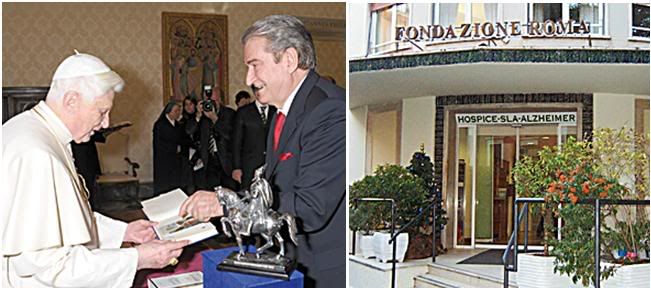 Two papal stories in this issue: On page 1, the Holy Father's audience for the Prime Minister of Albania, and in the inside
Two papal stories in this issue: On page 1, the Holy Father's audience for the Prime Minister of Albania, and in the inside
pages, a story about the hospice for terminally ill patients that he visits in Rome today. Also on Page 1, an essay on
the 40 days before Christmas observed by the Orthodox Churches to recall all the prophets, saints and Fathers of
the Church who led up to or illumined the faith on the Incarnation of Christ, starting with the conception of St. Anne,
'mother of the Mother of God'; and a companion piece inside about Mary and her role in the Incarnation. International
news on Page 1: In Copenhagen, developing nations say financial assistance offered by the richer nations to help them
convert their industries to acceptably 'green' standards falls far short of needed; and Obama calls on the Pakistan
government to stem the tide of Taliban and Al Qaeda violence.
THE POPE'S DAY
Visit to the Hospice Sacro Cuore for terminally ill patients. Address in Italian.
Sunday Angelus - The Holy Father blessed the 'Bambinelli' - images of the Baby Jesus -
placed by Italian children in their Christmas Nativity scenes, recalled the Day for
new Churches observed today by the Diocese of Rome, and remembered four missionary priests
recently killed in Africa.
[Modificato da TERESA BENEDETTA 14/12/2009 19:22] |
| |
 13/12/2009 14:46 13/12/2009 14:46 |
|
| | | OFFLINE | | Post: 19.072
Post: 1.719 | Registrato il: 28/08/2005
Registrato il: 20/01/2009 | Administratore | Utente Veteran | |
|

 Visit to a hospice:
Visit to a hospice:
The Pope's 'cardinal work of mercy'
on Gaudete Sunday
Translated from

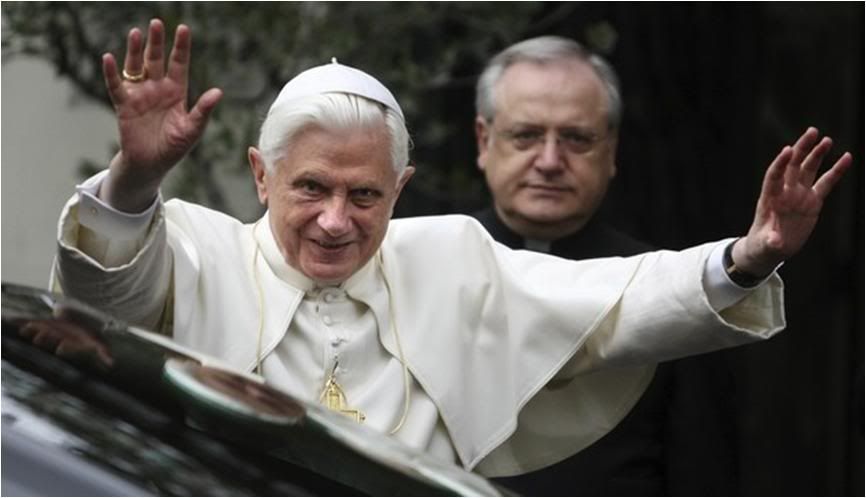
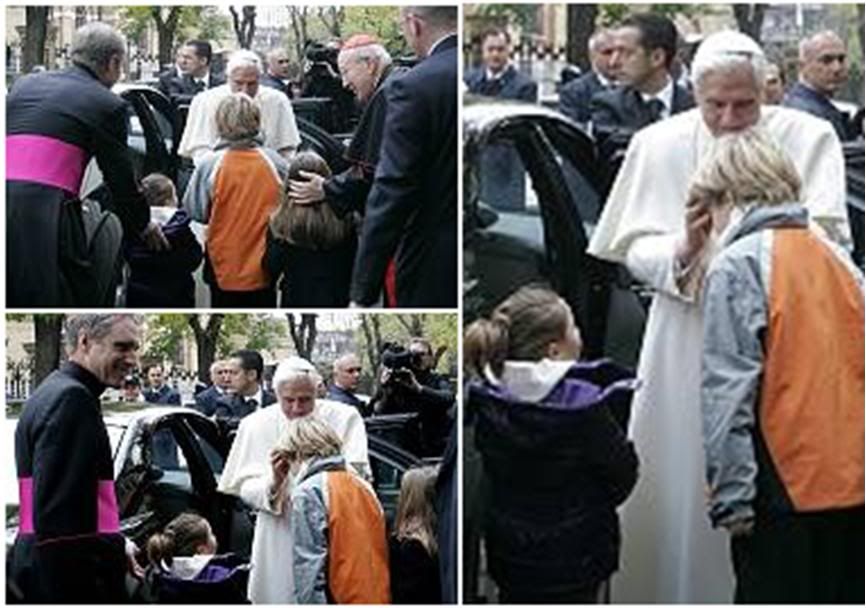
At 10 a.m. today, the third Sunday of Advent, the Holy Father visited the Hospice Fondazione Roma in the Roman neighborhood of Monteverde on Gianicolo (Janiculum) hill.
The health establishment, born 11 years ago as the Hospice Santo Cuore, at the initiative of the Circolo San Pietro and the Fondazione Cassa di Risparmio di Roma, provides free palliative care to terminally ill cancer patients, as well as to those afflicted with Alzheimer's and ALS (amyotrophic lateral sclerosis), both degenerative incurable diseases.
More than 30 patients are housed in the Hospice at present, and more than 200 are assisted in their own homes.
The Pope visited the patients and later met with doctors, nurses, the center staff and volunteers.
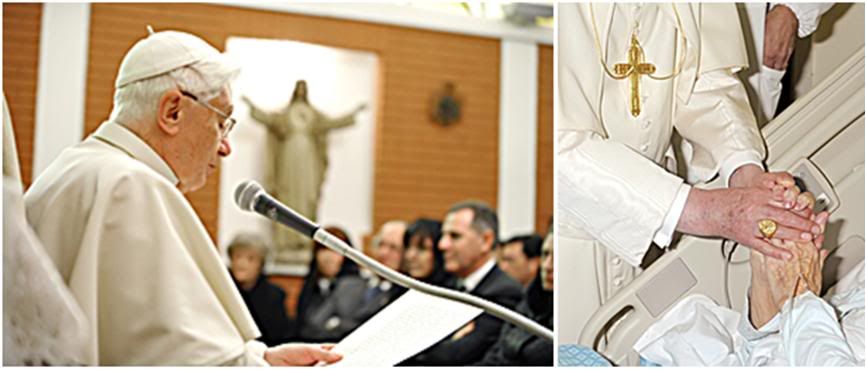
After a greeting from the president of Circolo San Pietro, Duke Leopoldo Torlonia, and the president of Fondazione Roma, Prof. Emmanuele Emanuele, the Pope delivered the remarks translated here:
Dear brothers and sisters!
I gladly accepted the invitation to visit this Hospice and I am very happy to be among you today. I address a heartfelt greeting to the Cardinal Vicar of Rome, Agostino Vallini, to the various auxiliary bishops, and all the priests present.
I sincerely thank Prof. Emmanuele Emanuele, President of Fondazione Roma, and Duke Leopold of Torlonia, President of Circolo San Pietro, for the words that they have courteously addressed to me.
With them, I also greet the administration of the Hospice Fondazione Roma; its president Alessandro Falez, the medical, nursing and administrative staff, the sisters and all who give a hand in any way to this worthy institution.
I address my particular appreciation to the volunteers of Circolo San Pietro, with whose zeal and generosity in bringing aid and comfort to the patients and their families I am familiar with.
This hospice was born in 1998 as the Hospice Sacro Cuore, at the initiative of the then General President of the Circolo San Pietro, the Marquis Marcello Sacchetti, whom I greet with grateful deference.
The task of this institution is to care for terminal patients, to alleviate their suffering as much as possible, and to accompany them with love as their condition worsens.
Those admitted to the Hospice have increased from 3 to thirty patients, who are followed daily by doctors, nurses and volunteers, to which we must add more than a hundred who are followed in their own homes.
All this has made of the Hospice - which has now been enriched by an Alzheimer's Unit and by an experimental project to extend the same assistance to ALS patients - a significant presence in the overall Roman healthcare system.
Dear friends, we know how some serious pathologies inevitably bring patients moments of crisis, disorientation and serious confrontation with their own personal situation.
Progress in the medical sciences offer instruments necessary to deal with this challenge, at least with the physical aspects. Nonetheless, it is not always possible to find a cure for every illness, and consequently, in hospitals and healthcare facilities around the world, we are faced with the suffering of so many incurable brothers and sisters, especially in their terminal stages.
Today, the prevailing mentality which is efficiency-driven tends to marginalize them, and considers them a weight and a problem for society.
But anyone with a sense of human dignity knows that they must be respected and sustained as they face the difficulties and sufferings associated with their condition. For this reason, palliative care is often resorted to these days, to alleviate the pain that comes with illness and to help the sick persons live through their pain with dignity.
But alongside this indispensable clinical attention, the sick must also be given concrete gestures of love, closeness and Christian solidarity, to help them confront their need for understanding, comfort and constant encouragement.
And that is what is happily taking place here, at the Hospice Fondazione Roma, whose central commitment is care and attentive hospitality for patients and their families, according to the teaching of the Church which, through the centuries, has always shown herself to be a loving mother to those who suffer in body and spirit.
In my appreciation for the praiseworthy work done here, I wish to encourage all those who, making themselves into concrete icons of the Good Samaritan, who is " oved with compassion" and cares for his neighbor (cfr Lk 10,33-34), offer daily to the patients and their families adequate assistance that is attentive to the needs of each person.
Dear patients and families, whom I have just been able to meet individually, I have seen in your eyes the faith and strength that sustain you in difficulties. I came to offer to each one a concrete testimony of my closeness and affection.
I assure you of my prayers, and I invite you to find in Jesus support and comfort, so that you may never lose trust and hope. Your ailment is a truly painful and singular trial, but in the face of the mystery of God, who assumed our mortal flesh, it acquires sense and becomes a gift and occasion for sanctification.
When the suffering and discomfort become worse, just think that Christ is associating you with his Cross because he wants to say through you a word of love to those who have lost their way in life and, closed up in their empty selfishness, live in sin, remote from God.
Indeed, your health conditions bear witness that true life is not in this world, but with God, where everyone of us will find joy if one humbly walks behind the truest of men: Jesus of Nazareth, Lord and Master.
The season of Advent, in which we are immersed, speaks to us of God's visit and invites us to prepare the way for him. In th elight of faith, we can read in sickness and suffering a particular experience of Advent as a visit by God who mysteriously comes to us to free us from loneliness and the absence of sense, to transform pain into a time for encounter with him, for hope and for salvation.
The Lord is coming - he is here, among us! This Christian certainty helps us to understand even 'tribulation' as one way in which He can come to us and become for each person the "God with us' who liberates and saves.
Christmas, for which we are preparing, offers us the possibility to contemplate the Holy Infant, true light who comes to the world to manifest "the grace of God...saving all" (Tit 2,11).
With the sentiments of Mary, let us all entrust ourselves, our lives, adn our hopes to him. Dear brothers and sisters, with these thoughts I invoke on each of you the maternal protection of the Mother of Jesus, whom the Christian people involve in tribulation as Salus infirmorum (Health of the sick), and I impart on you from the heart a special Apostolic Blessing, as a token of intimate spiritual joy and authentic peace in the Lord.
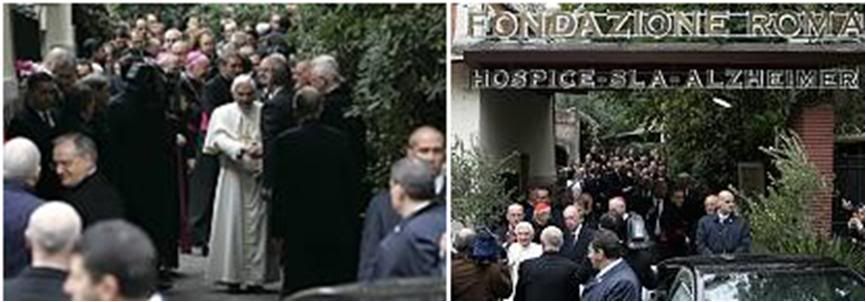
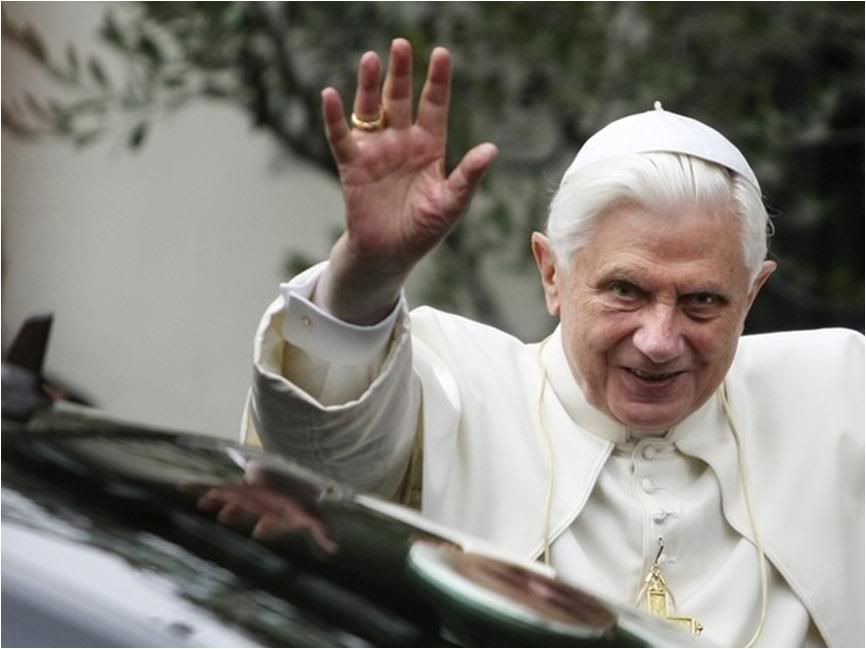
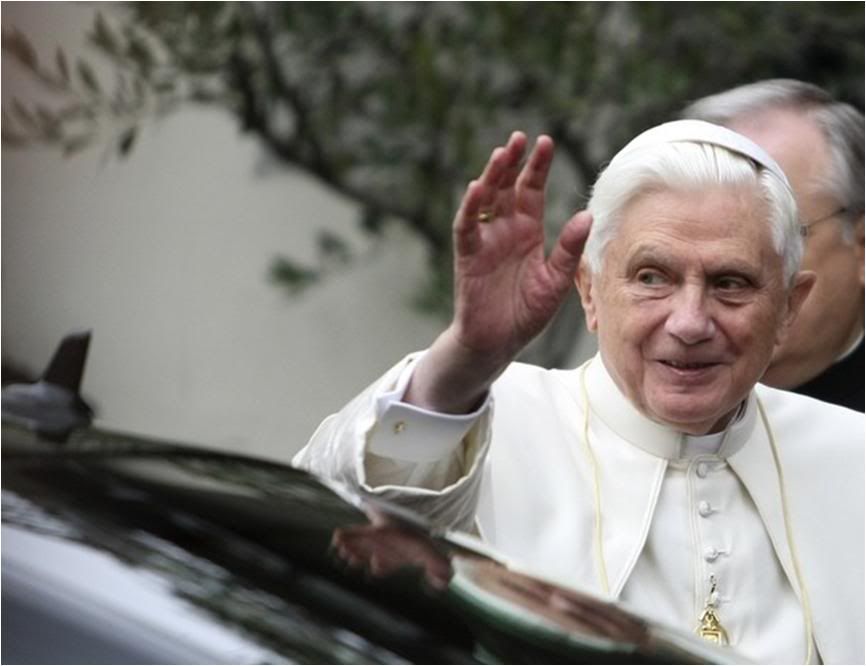

[Modificato da TERESA BENEDETTA 15/12/2009 00:46] |
| |
 13/12/2009 15:02 13/12/2009 15:02 |
|
| | | OFFLINE | | Post: 19.073
Post: 1.720 | Registrato il: 28/08/2005
Registrato il: 20/01/2009 | Administratore | Utente Veteran | |
|
 ANGELUS TODAY
ANGELUS TODAY
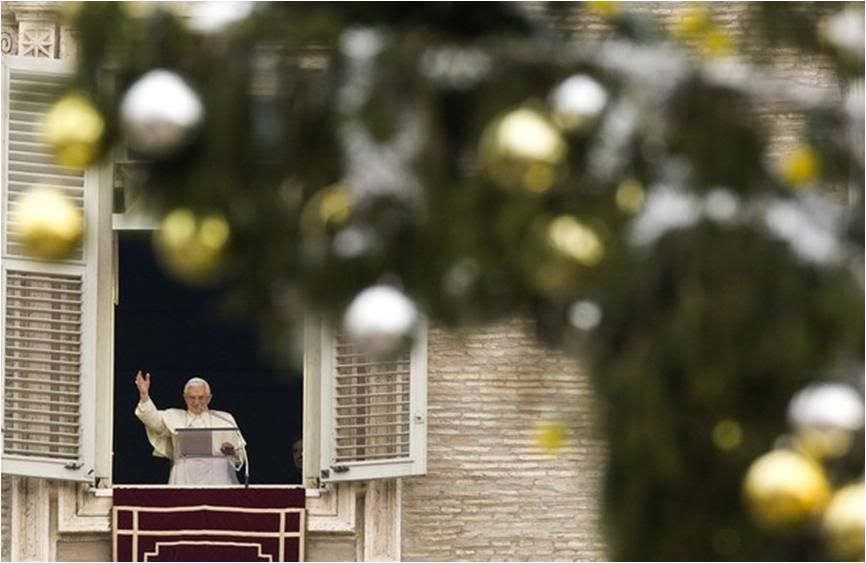
The Holy Father blessed the 'Bambinelli' - images of the Baby Jesus -placed by Italian children in their Christmas Nativity scenes, recalled the Day for New Churches observed today by the Diocese of Rome, and remembered four missionary priests recently killed in Africa.
In English, he said this:
The liturgy of this Third Sunday of Advent, marked by joyful expectation of the Lord’s coming, invites us to rejoice in the hope of our salvation.
May these days of preparation for Christmas be a time of genuine conversion and interior renewal for all Christians. Upon you and your families I invoke joy and peace in Jesus our Saviour.
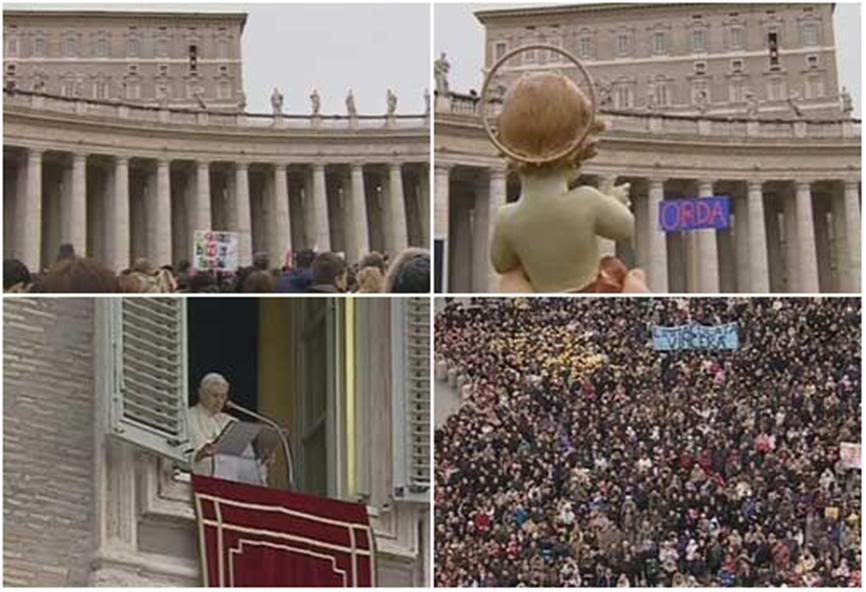
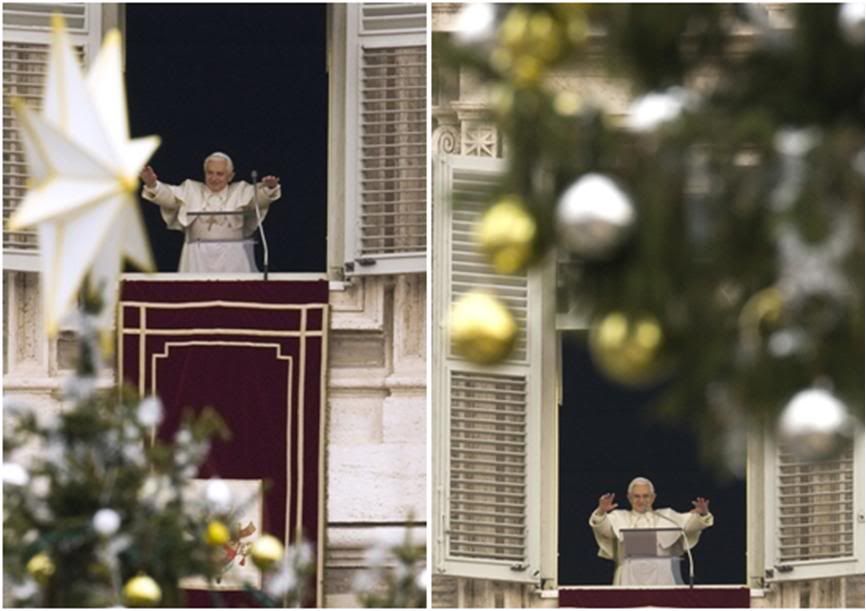 Pope hails missionaries
Pope hails missionaries
murdered in Africa

VATICAN CITY, Dec. 13 (AFP) – Pope Benedict XVI paid tribute Sunday to four missionaries murdered in separate incidents in Africa this month and called for peace.
"I have heard the sad news this week from certain African countries about the murders of four missionaries," the Pope said in Sunday prayers.
"They were brave witnesses of the Gospel which they proclaimed with courage, risking their lives," he said, calling on God for "peace and reconciliation".
Armed men killed Roman Catholic priest Monsignor Daniel Cizimya in his presbytery in the eastern Democratic Republic of Congo on December 5.
A nun, Sister Denise Kahambo Maharirwa, was shot dead by gunmen who raided a monastery in the same area two days later.
Father Louis Blondel was shot dead December 9 in his rectory during a burglary in a shantytown in South Africa.
Irish priest Jerry Roche was killed in Kenya on December 11 in what reports said was a violent robbery.
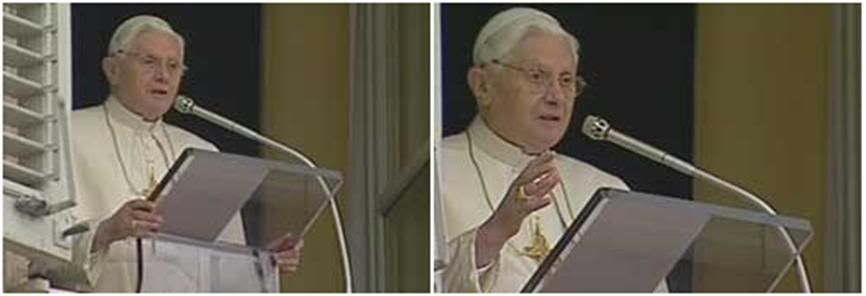 Here is a translation of the Holy Father's words at the Angelus:
Here is a translation of the Holy Father's words at the Angelus:
Dear brothers and sisters!
We have come to the third Sunday of Advent. In the liturgy today, the Apostle Paul's appeal resounds: "Rejoice in the Lord always. I shall say it again: rejoice! Your kindness should be known to all. The Lord is near" (Phil 4,4-5).
Mother Church, as she accompanies us towards the Holy Nativity, helps us to rediscover the sense and taste of Christian joy, so different from that of the world.
On this Sunday, following a beautiful tradition, the children of Rome come to have the Pope bless their images of the Baby Jesus to be placed in their creches.
Indeed, today I see so many children with their parents, teachers and catechists here today in Piazza San Pietro. Dearest ones, I greet you all with great affection and I thank you for coming.
It is a great cause of joy for me to know that in your families you keep the practice of putting up a Nativity scene for Christmas. But it is not enough to carry on a traditional practice, as important as that is.
One must seek to live in the reality of every day that which the creche represents - which is, the love of Christ, his humility and his poverty.
That is what St. Francis did in Greccio: he recreated a living Nativity scene so that he could contemplate and adore the Son of God, but above all, to put into practice the message of Him who for love of us, stripped himself of everything to become a little baby.
The blessing of the 'Bambinelli', as we say in Rome, reminds us that the creche is a school of life, where we can learn the secret of true joy. This does not consist in having many things, but in feeling loved by the Lord, in giving ourselves to others, and in loving each other.
Let us look at the Nativity scene: Our Lady and St. Joseph do not seem to be a very fortunate family - they had their first child in the middle of great discomfort - but yet they are full of intimate joy, because they love each other, they help each other, and above all, they are certain that God was at work in their story, making himself present in the tiny Jesus.
What about the shepherds? What reason did they have to rejoice? That Newborn would certainly not change their condition of poverty and emargination. But faith helps them to recognize in the "infant wrapped in swaddling clothes and lying in a manger", the sign of the fulfillment of God's promise to all men "on whom his favor rests'(Lk 2,12-14), including themselves.
And that, dear friends, is what true joy consists of: it is to feel that our personal and communitarian existence has been visited and filled with a great mystery, the mystery of God's love.
In order to rejoice, we do not need things alone, but love and truth: we need a God who is near us, who warms our heart and responds to our profound expectations.
This God manifested himself in Jesus, born of the Virgin Mary. That is why this Bambinello, whom we place in a cave or in a humble hut, is the center of everything - he is the heart of the world.
Let us pray so that every man, like the Virgin Mary, may welcome as the center of his own life the God who became a Baby, source of true joy.
After the prayers, he said this:
As I thank the Centro Oratori Romani who organized this event of the Bambinelli, I also wish to recall that today is the Day for New Churches in the Diocese of Rome.
In our city, there are sill communities who do not have a proper place for worship - in which the Lord dwells with us - nor do they have structures for their formative activities.
Therefore, I renew my appeal to everyone to contribute for the completion of the necessary pastoral centers. Thank you for your generosity.
This week, sad news has come to me from some African countries regarding the killing of four missionaries - Fathers Daniel Cizimya, Louis Blondel and Gerry Roche, and Sister Denise Kahambu.
They were faithful witnesses to the Gospel which they announced with courage even at the risk of their own lives. As I express my closeness to their families and communities in their sorrow, I call on everyone to join my prayers that the Lord may welcome them into his home, comfort those who mourn them, and bring reconciliation and peace with his coming.
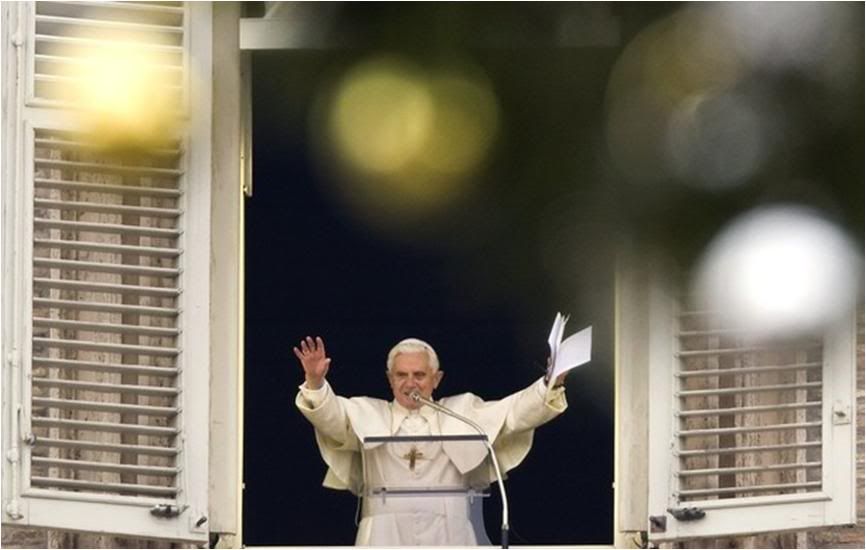
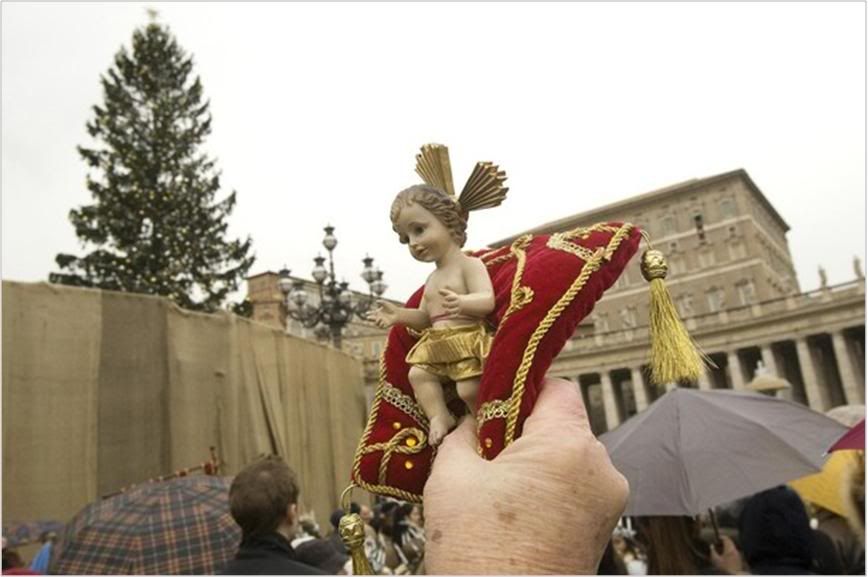 A pilgrim holds up a 'Bambinello' from a spot next to the 'curtained' area next to the Vatican Christmas tree,
A pilgrim holds up a 'Bambinello' from a spot next to the 'curtained' area next to the Vatican Christmas tree,
where the Nativity scene will be unveiled on Christmas Eve.

[Modificato da TERESA BENEDETTA 13/12/2009 22:48] |
| |
 14/12/2009 17:50 14/12/2009 17:50 |
|
| | | OFFLINE | | Post: 19.078
Post: 1.724 | Registrato il: 28/08/2005
Registrato il: 20/01/2009 | Administratore | Utente Veteran | |
|
 Monday, December 13
Monday, December 13
 ST. JUAN DE LA CRUZ (John of the Cross) (Spain, 1541-1591)
ST. JUAN DE LA CRUZ (John of the Cross) (Spain, 1541-1591)
Carmelite, Reformer, Mystic, Theologian, Poet, Doctor of the Church
There is probably no spiritual partnership as blessed and endowed with grace as that of the two great mystics and writers who flowered in the Spain of the Counter-Reformation - Teresa de Jesus and Juan de la Cruz, both sprung from the soil of Castile, the female and male faces of 16th century spirituality. Contemporaries and friends, they worked together to reform the Carmelite Order and experienced the fate of all reformers who are rejected by the establishment. Juan's life was a true identification with the Cross from which he took his name, producing his best poems and writings while languishing in prison, turning his 'dark night of the soul' into luminous prose and verse that continue to be models of mystical theology as well as undying literature.
No OR today.
THE POPE'S DAY
The Holy Father met today with
- H.E. Milo Djukanovic, Prime Minister of Montenegro, with his wife and delegation
- Bishops of Belarus (Byelorussia) on ad limina visit
- Hon. Hans-Dietrich Genscher, former Federal Minister for Foreign Affairs of the Federal Republic of Germany
and three of his recent appointments who have been elevated to the rank of Archbishop, along with their families:
- Mons. Jean Laffitte, Secretary of the Pontifical Council for the Family
- Mons. Mario Toso, S.D.B., Secretary of the Pontifical Council for Justice and Peace
- Mons. Giovanni D’Ercole, F.D.P., new Auxiliary Bishop for L'Aquila.
Cardinal Tarcisio Bertone consecrated the three new archbishops last weekend.
The Vatican Press Office reported today on the pre-synodal meeting held by the Patriarchs of the Eastern Churches
and other Middle East Prelates to prepare for the special assembly of the Bishops Synod next October devoted to
the Church in the Middle East.
|
| |
 14/12/2009 18:56 14/12/2009 18:56 |
|
| | | OFFLINE | | Post: 19.079
Post: 1.725 | Registrato il: 28/08/2005
Registrato il: 20/01/2009 | Administratore | Utente Veteran | |
|

 The Tablet says Pope's UK visit
The Tablet says Pope's UK visit
will take place Sept. 16-19, 2010

ROME, Dec. 14 (Translated from SIR) - The English Catholic weekly The Tablet writes that Benedict XVI's precedent-setting state visit to the United Kingdom next year will take place Sept. 16-19, will include a day in Scotland, and will climax in the beatification rite for Cardinal John Henry Newman.
In recent days, the British press has speculated on some of the key events in the Pope;s visit,including an address to Members of Parliament at the historic Westminster Central Hall, where St. Thomas More was condemned to death in 1535; and an address to the world of culture at Oxford University.
The Tablet says that a delegation from the Catholic Church in Britain and in Scotland was at the Vatican last week to discuss the details of the Pope's program.
Unlike John Paul II's 1982 visit, Benedict's trip will not only be a pastoral visit to the Catholics of the United Kingdom, but also a true and proper state visit [the highest category of visit that can me made by a chief of state, in which the host government pulls out all the pomp and circumstance it can muster aa a tribute to the visitor and the country he represents]. [Well, Benedict has a stamp-sized territory but he does represent the world's largest religion - which in its own way - might be considered to have taken over in terms of reach from the mighty and farflung British Empire of old 'where the sun never set'.]
Because of thw state visit aspect, there is a government committee to handle the preparations, under the secretary of the British cabinet, Sir Gus O'Donnell. His counterparts on the side of the Church are Mons. Andrew Sommergill, former secretary-general of the bishops' conference of England and Wales, and Fr. Paul Conroy, secretary of the Scottish bishops conference.
Sommergill and Roy led the delegation to the Vatican. The Tablet apparently notes how unusual it will be for Benedict XVI to preside a a beatification rite, now normally presided over by the bishop of the new blessed's home diocese and a representative of the Congregation for the Causes of Sainthood from the Vatican.
[But it is not all that unusual, considering that until Benedict XVI himself instituted the curtrent 'norm', all beatifications were presided over by the Pope at the Vatican - although when the occasion presented itself, John Paul II found it fitting to beatify some of the new blessed ones in their own homelands if he happened to be visiting at the time.
Benedict XVI really is not making 'an exception to his own rule', as some Vaticanistas have expressed it. He's not celebrating it in the Vatican, to begin with, and since he would be on Cardinal Newsman's turf, I don't think the local bishop - who will be the ranking concelebrant of the Pope - will mind concelebrating with the Pope, instead of say, Archbishop Amato, who would probably have represented the Pope in other circumstances.]
I immediately tried to get this report from the original source, but I can't seem to see it on the Tablet's site so far, at least not in the headlines and teasers that they make available to non-subscribers. They don't even have any 'free' articles this week! Nor can I find anything in the other British papers yet, not even from Damian Thompson.
P.S. There was this late report in the Telegraph commenting on the choice of Convetry airport for the Beatification Mass of Cardinal Newman:
Pope Benedict sent to Coventry
for the climax of his visit
by Tim Walker

Dec. 15, 2009
As the backdrop to the climatic moments of Pope Benedict XVI's historic first trip to Britain, it seems, to say the least, unexpected.
Reuters Mandrake hears, however, that the centrepiece of the pontiff's visit, the beatification of Cardinal John Henry Newman, will take place at Coventry Airport.
"It is a nice central location and holds good memories because Pope John Paul II spoke there during his 1982 visit," whispers my Roman Catholic mole.
The airport is best known in recent years for the death of Jill Phipps, an animal rights protester, during clashes with police over the export of live calves in 1995.
Wembley Stadium had previously been seen as a more likely venue for the beatification ceremony, which is the last process before sainthood, of Cardinal Newman, who converted from Anglicanism in 1845.
The Pope, 82, is expected to stay at Buckingham Palace in September when he makes only the second Papal visit to this country since Henry VIII broke with Rome and established the Church of England 500 years ago.
[I really must question again the bit about the Pope staying at Buckingham Palace because there is no precednet at all for a Pope travelling abroad staying at other than the Apostolic Nunciature in teh host country.]
I reported in October that sources at the Vatican claimed the Queen's sympathy for Catholicism had increased as she had become "appalled'', along with the Prince of Wales, at developments in the Church of England, of which she is Supreme Governor. The Queen, 83, is said to have an "affinity" with the Holy Father, who is of her generation.
[Modificato da TERESA BENEDETTA 17/12/2009 17:52] |
| |
 15/12/2009 00:10 15/12/2009 00:10 |
|
| | | OFFLINE | | Post: 19.081
Post: 1.727 | Registrato il: 28/08/2005
Registrato il: 20/01/2009 | Administratore | Utente Veteran | |
|
 Pope Benedict has unusually
Pope Benedict has unusually
busy Monday of audiences

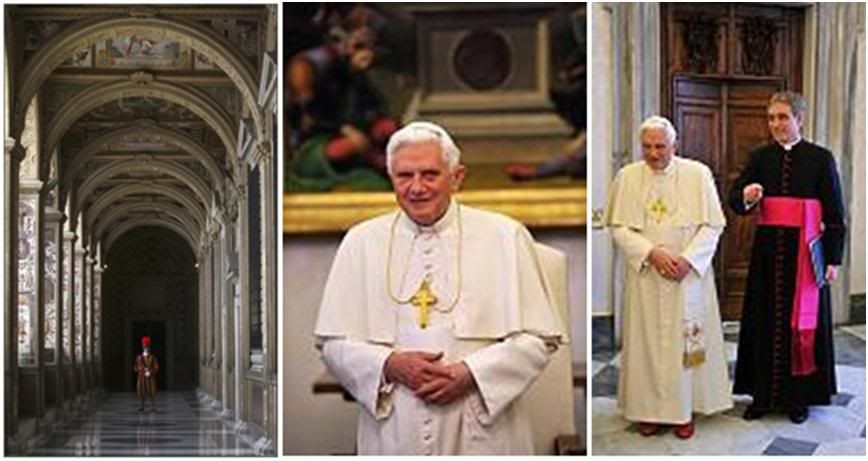
Vatican City, Dec 14, 2009 (CNA).- Pope Benedict XVI had brief audiences with a number of people on Monday morning, including three newly ordained bishops and the prime minister of Montenegro.
[CNA forgets to mention the one audience that was by no means brief today - the Pope meeting with the bishops of Belarus (Byelorussia) on their ad limina visit.]
Bishops Jean Laffitte, Mario Toso and Giovanni D'Ercole were accompanied by family members as they met Benedict XVI at the Papal residence in Vatican City. The three were ordained as bishops just a day earlier at a well attended ceremony officiated by the Holy See's Secretary of State, Cardinal Tarcisio Bertone.
Each of them had already received orders for a new appointment in the last 2 months.
Bishop Laffitte, who had worked with the Pontifical Council of the Family as an under-secretary since 2005, became Secretary of that Council on Oct. 22, 2009.
On that same date, Bishop Toso was appointed as of Secretary of the Pontifical Council for Justice and Peace from his post at the Pontifical Salesian University of Rome, where he had been serving as Dean of the Philosophy Department since 2003.
Bishop Giovanni D'Ercole, a former director of the Holy See's press office, was chosen to be Auxiliary Bishop of Aquila, the region of Italy hit hardest by an earthquake earlier this year.
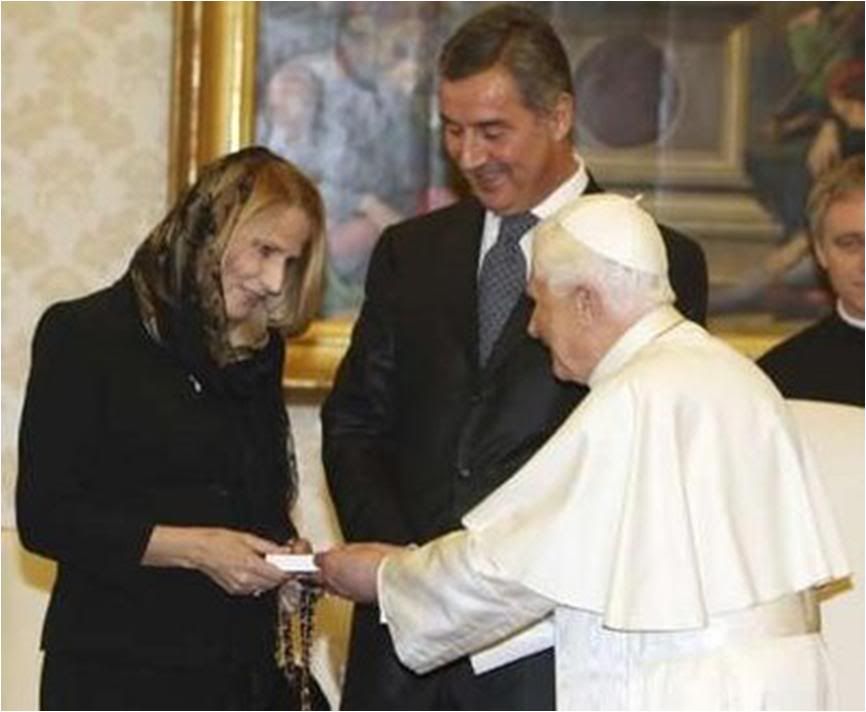

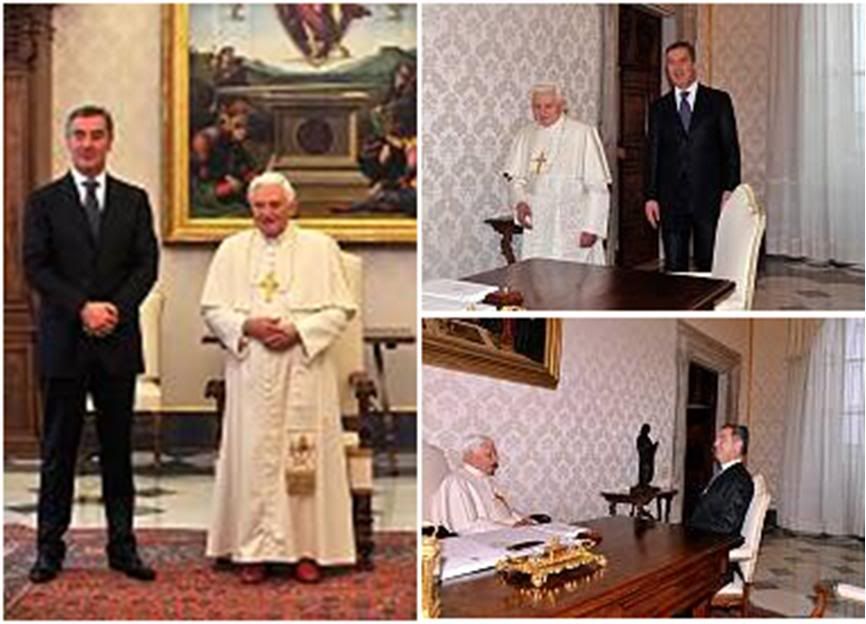
The Holy Father also received the Prime Minister of Montenegro, Milo Djukanovic, in audience Monday morning. Following his encounter with the Pope, the prime minister went on to meet with Cardinal Secretary of State Tarcisio Bertone and Archbishop Dominique Mamberti, the secretary for Relations with States.
In the meeting, the Secretaries and prime minister Djukanovic discussed current international affairs, the present domestic situation and the challenges facing Montenegro. They also touched on the Montenegrin government's efforts to promote "peace and harmony" among the country's ethnically and religiously diverse population.
Montenegrin and Serbian Orthodox Churches have been in dispute since the 1920's about which is the legitimate Church in the small country. Adding to the confusion, the bishop of the Montenegrin Orthodox Church, Mihailo, was ordained by the patriarch of a schismatic synod of the Bulgarian Orthodox Church in 1998. Upon being ordained, Mihailo was excommunicated by the Orthodox Church of Istanbul.
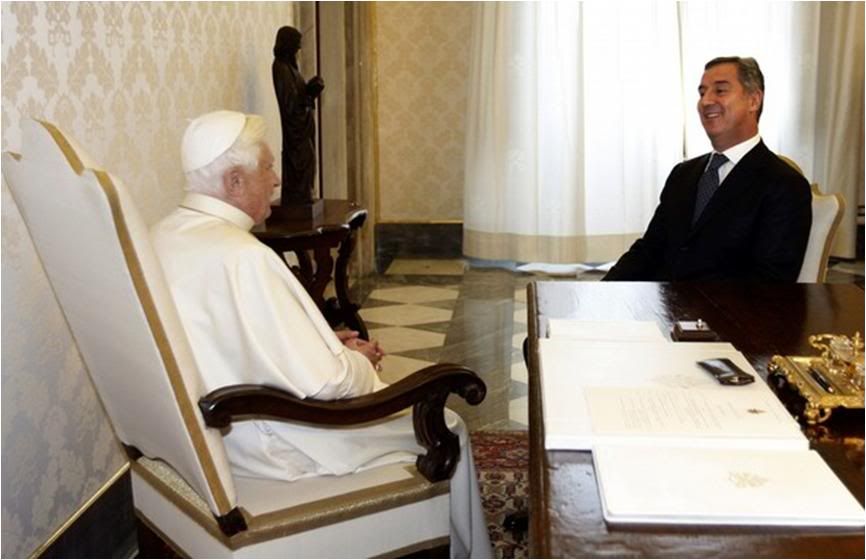
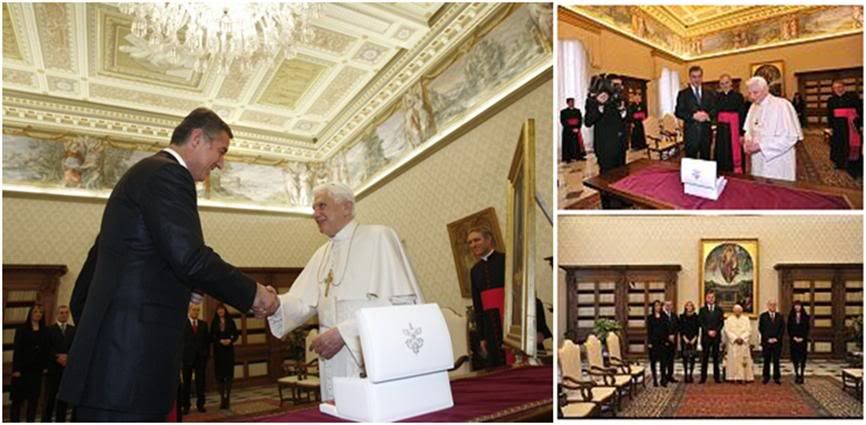 Vatican diplomacy manifests
Vatican diplomacy manifests
hopeful realism, Fr. Lombardi says

VATICAN CITY, DEC. 14, 2009 (Zenit.org).- Benedict XVI met this month with leaders from three nations where the situation of the Church is touchy. According to a Vatican spokesman, these types of meetings reflect a principle of Holy See diplomacy: the realism of hope.
Jesuit Father Federico Lombardi, director of the Vatican press office, dedicated the most recent edition of Vatican Television's "Octava Dies" to a reflection on the Pope's meetings with the new ambassador from Cuba, and the presidents of Russia and Vietnam.
He suggested that Vatican diplomacy pursues a dialogue of hope in the name of the Gospel for the good of humanity.
So for example, Father Lombardi said, when the Holy Father was visited by the new Cuban ambassador to the Holy See, Eduardo Delgado Bermúdez, "the Pope observed that, despite the difficulties in relations with the Holy See over the past decades, and above all the limitations on the Church's activities, diplomatic relations have never been interrupted and the improvements are appreciable."
"The Pope's meeting with Russian President Medvedev,” Father Lombardi continued, "was the occasion to announce the establishment of diplomatic relations with the Russian Federation, concluding the 20 year effort at rapprochement with official but not yet full relations."
This, the Jesuit underscored, "is a significant step forward," demonstrating that "the situation of past hostility of the Soviet communist regime is today a memory."
Finally, the audience with the president of Vietnam, Nguyen Minh Triet, "must be considered as a further stage in the hoped for journey toward the normalization of relations with the Asian country, where the Catholic Church counts on a large and dynamic community," Father Lombardi asserted.
He noted how Catholics in Vietnam are "celebrating this year an important jubilee year" and "despite the difficulties of past decades, looks to the future in hope."
In this way, the Vatican spokesman proposed, "the Holy See -- with patience and a farsighted approach -- continues to weave together its dialogue with the leaders of nations, thinking of the good of the Church in their countries and in the perspective of understanding and peace among all peoples.”
"[The Vatican's] diplomacy is not guided by weakness or the spirit of compromise," Father Lombardi affirmed. "It is a matter of, as has been well said in the past, the 'realism of hope.'
[Modificato da TERESA BENEDETTA 15/12/2009 00:19] |
| |
 15/12/2009 12:10 15/12/2009 12:10 |
|
| | | OFFLINE | | Post: 19.082
Post: 1.728 | Registrato il: 28/08/2005
Registrato il: 20/01/2009 | Administratore | Utente Veteran | |
|

 Vietnamese Catholics hope to meet
Vietnamese Catholics hope to meet
the Pope in the near future
by JB Vu

Ho Chi Minh City, dEC. 14 (AsiaNews) – Vietnamese Catholics have welcomed the Rome visit by their president, Nguyen Minh Triet, who met Benedict XVI, a move forward in establishing diplomatic relations between the two parties and a step closer to a papal visit to their country.
In Vietnam, government media have stressed that the President’s visit to the Pope is part of a process that should lead to diplomatic relations. They have focused on talks between the Pope and the President, who is the second high Vietnamese official to visit the Vatican after Prime Minister Nguyen Tan Dung came in January 2007.
Vietnam started its march towards integration with the rest of the world in 1987 when it began opening up its economy. One of the five remaining ‘Socialist’ nations in the world, the country is also one of the poorest, especially burdened by a long war in the 20th century. Despite past and recent economic crises, it has had a growth rate between 6.5 and 8.5 per cent since it opened its doors. The current crisis has been felt but not as much as elsewhere.
North Vietnam and the Holy See broke off diplomatic relations in the 1950s, and the Vatican moved its mission to Saigon. When unification occurred in 1975, ties were cut off completely.
During this year’s ‘ad limina’ visit, Vietnamese bishops invited the Pontiff to visit the country during the current Jubilee marking 350 years of evangelisation and the 50 years of the country’s Catholic hierarchy. Celebrations are set to end on 6 January 2011.
Vietnam has diplomatic relations with more than 100 countries. It still subscribes to Marxist theory but faces many social problems. State and religions hold different viewpoints, and this has meant to an anti-religious bias, at least among local officials whose suspicions about religious activities are the result of ignorance and a lack of communication.
Given this situation, religions have been seen as opposing national policies, and this has led to conflict. People, especially the poor, end up bearing the burden of suspicion and discrimination.
During the ‘ad limina’ visit by Vietnamese bishops, Benedict XVI said, “We live in the Gospel and the nation, and do not want to replace the government. We want dialogue and good collaboration.”
On 28 November, Mgr Bui Van Doc, bishop of My Tho and chairman of the Committee on Catechism and Faith of the Vietnam Bishops’ Council, talked about dialogue and cooperation with the government.
“The Church,” he explained, “calls on all its members to build a fair, truthful and humane society. The Church does not want to replace government; it only hopes for a spirit of dialogue, cooperation and mutual respect. The Church is part of the nation and wants to serve the people.”
Vietnam is a Socialist nation that has opened up its economy to capitalism. The Communist government rules the nation, the State guides it, and the people “own” it.
The government has always claimed that it respects freedom of religion and that it provides the bases for its development. However, anti-Catholic discrimination and bias have occurred in the past.
The establishment of diplomatic relations with the Holy See is part of a process of communication, discussion and cooperation that has progressed over the past 20 years. During that period, contacts have been established and delegations have met at different levels. An official joint working group met in February to discuss the re-establishment of diplomatic relations. Both sides have confirmed that progress has been made, but formal diplomatic relations have not yet been announced.
During his meeting with the Pope, President Triet invited the Holy Father to visit the country.
For the Vatican, the President’s visit is a “positive signal” and can help relations to develop. However, nothing has changed yet for Vietnam’s Catholic community. Many of its members are still concerned that the visit might just be diplomatic propaganda.
At home, everyone wants good bilateral relations to reduce religious tensions in the country, the government because it wants to run the Catholic community, the Vatican because it wants a legal basis to protect it.
|
| |
 15/12/2009 13:08 15/12/2009 13:08 |
|
| | | OFFLINE | | Post: 19.083
Post: 1.729 | Registrato il: 28/08/2005
Registrato il: 20/01/2009 | Administratore | Utente Veteran | |
|
 In his Dec. 14 blog post, Sandro Magister picks out a Catholic sociologist's comparison of John Paul II and Benedict XVI as communicators, from an analysis of the Church and the mass media delivered at the last plenary assembly of the Italian bishops' conference in Assisi.
The Popes as communicators
Translated from
In his Dec. 14 blog post, Sandro Magister picks out a Catholic sociologist's comparison of John Paul II and Benedict XVI as communicators, from an analysis of the Church and the mass media delivered at the last plenary assembly of the Italian bishops' conference in Assisi.
The Popes as communicators
Translated from

Last month, at their plenary meeting in Assisi, more than 200 bishops from all Italy listened behind closed doors to a discourse on "The image of the Church and media communications" by Chiara Giaccardi, professor of the sociology of mass communications at the Catholic University of the Sacred Heart [main campus in Milan].
In the final part of her analysis, Giaccardi compared the communicative gifts of John Paul II and his successor:
If we look at recent history, the Church has been able to field many important communications challenges.
In an era of globalization, it was the first planetary network to exploit for human promotion the potential of interconnectivity.
The pontificate of John Paul II was, in this sense, an example of the innovative and conscious use of the media (understood, with McLuhan, as a means of communications as well as of 'transport'), anticipating and embodying in the most authentic way the potentials of globalization in terms of mobility, permeability of frontiers, the de-spatialized simultaneity of experience - even the religious, the intercultural component of communications, and the like.
But John Paul II was also able to communicate the dignified silence of suffering as a condition that is common to all men, one that is inseparable to existence and which makes us brothers in Christ.
The communicative talent of Benedict XVI is different: it is expressed in the 'spoken' word that is measured, through that
léghein [the Greek root verb for logos, meaning 'to relate'] which unites simply by being said - words impregnated with logos - not 'magic' words like those whereby mass media has conditioned contemporary society, words that promise instant marvelous transformations (of our body, of our life expectancy, etc), which give rise to 'hyper' sensibilities and exaggerated emotional states.
Communicative ability like that of Benedict XVI's is specially precious - but at the same time especially difficult - for our time. One of the challenges that the Church must field is precisely to re-educate society to a discourse of logos, words with sense, that can inspire listening that can be demanding and shatter fragile certainties, but is liberating from the totalitarian and reductive communications that characterizes contemporary culture, a sort of Fantasyland that cannot withstand a closer look.
Communications through a discourse of logos is the very opposite of what today's society has become used to - a series of slogans and 'Open Sesame' words which do not resolve problems, are not even helpful to understand them, but which are sedative and tranquilizing because they shut out questions without attempting comprehension, they offer easy soothing responses that are ineffectual and soon forgotten, easily replaced by new catchwords.
A substantial part of Giaccardi's lecture is published tin the Dec. 13 issue of Avvenire.
Cutting through Prof. Giaccardi's 'technical' language, Benedict XVI's communication is distinguished by a demanding realism. Indeed, he often says, in effect, that if you want easy solutions and magic formulas, Christianity is not your answer: It's not easy to follow Christ, but it's the way to go because it leads to true joy and eternal life.
[Modificato da TERESA BENEDETTA 15/12/2009 13:10] |
| |
 15/12/2009 14:10 15/12/2009 14:10 |
|
| | | OFFLINE | | Post: 19.084
Post: 1.729 | Registrato il: 28/08/2005
Registrato il: 20/01/2009 | Administratore | Utente Veteran | |
|
 Tuesday, December 15
Tuesday, December 15
 BLESSED MARIA FRANZISKA [Mary Frances] SCHERVIER (Germany, 1819-1875)
BLESSED MARIA FRANZISKA [Mary Frances] SCHERVIER (Germany, 1819-1875)
Born to a wealth family in Aachen, she was cured of asthma after a pilgrimage to Lourdes.
As a teenager, she ran the household when her mother died, and after losing two sisters to
tuberculosis, she became a lay Franciscan renowned for her generosity to the poor. In 1851,
she founded the Sisters of the Poor of St. Francis, which set up hospitals and homes for
the aged to serve the indigent. By 1858, the order had a branch in the United States, and
in 1863, Mother Mary Frances herself went to the US to help nurse Civil War wounded, making
a second trip to the order in 1868. By the time she died, her order had 2500 members in many
countries. She was beatified by Paul VI in 1974.
OR for 12/14-15/09:
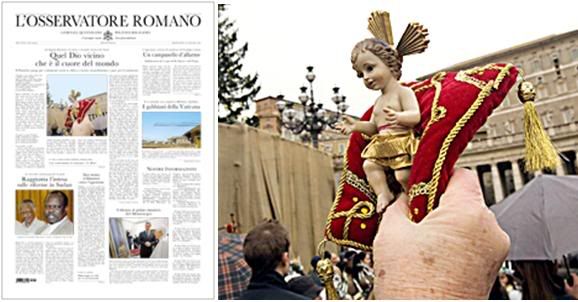
At Sunday's Angelus, Benedict XVI calls on the faithful
to rediscover the sense of Christmas:
'The God at hand who is the heart of the world'
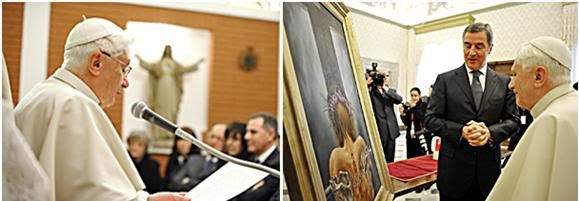 The double issue also contains coverage of the Pope's visit to a Rome hospice for terminally-ill patients (left
The double issue also contains coverage of the Pope's visit to a Rome hospice for terminally-ill patients (left
photo, below), and his audience for the Prime Minister of Montenegro yesterday. Page 1 also has a brief
editorial denouncing the unprecedented attack on Sunday that caused serious injuries to Italian Prime Minister
Silvio Berlusconi; an agreement on democratic reforms for the Sudan to be put in place before the April general
elections; and Iran's Supreme Leader issues stern warnings to the political opposition to 'follow the right way'.
No events scheduled today for the Holy Father.
Two papal texts were released today:
- A Motu Proprio, Omnia in mentem, which modifies some provisions in the Code of Canon Law
regarding the function of deacons and aspects of matrimony.
- The Holy Father's message for the 2010 World Day of Peace next January 1.
[Modificato da TERESA BENEDETTA 15/12/2009 14:10] |
| |
 15/12/2009 14:20 15/12/2009 14:20 |
|
| | | OFFLINE | | Post: 19.085
Post: 1.730 | Registrato il: 28/08/2005
Registrato il: 20/01/2009 | Administratore | Utente Veteran | |
|
 Pope calls for urgent action
Pope calls for urgent action
to protect the environment
in World Peace Day message
by ALESSANDRA RIZZO

VATICAN CITY, Dec. (AP) — Pope Benedict XVI called for urgent action to protect the environment, saying Tuesday that climate change and natural catastrophes threaten the rights to life, food, health — and ultimately peace.
In his annual message on the Roman Catholic Church's World Day of Peace, the Pope argued that the world's economic, social, and environmental problems are moral crises that require mankind to rethink its way of living.
"We can no longer do without a real change of outlook which will result in new life-styles," he said, touching again on a theme that has earned him a reputation as the "green pope."
Benedict called on advanced societies to adopt "more sober lifestyles," reducing energy consumption and favoring energy-efficient policies. He encouraged research into ways to exploit solar energy, to manage forests and to improve waste disposal.
Action is more pressing than ever "in the face of signs of a growing crisis which it would be irresponsible not to take seriously," he said.
The Roman Catholic Church marks the World Day of Peace on Jan.1. but the Pope's message to world leaders is released by the Vatican in advance.
The message this year comes as world leaders are arriving for high-profile climate talks in Copenhagen designed to hammer out a deal to curb emissions of the heat-trapping greenhouse gases that cause global warming.
Noting that climate change, and resulting desertification, could push millions into poverty, hunger, conflict and displacement, the Pope said: "All these are issues with a profound impact on the exercise of human rights, such as the right to life, food, health and development."
Benedict said industrialized countries should recognize their responsibility for the current environmental crisis and show solidarity toward developing nations. However, emerging countries are not exempt from their own responsibility and there is a need for internationally-coordinated action, he said.
Talks in Copenhagen hit a snag Monday when developing countries temporarily boycotted, fearing wealthier countries were going back on promises to cut greenhouse gases. Deep divisions remain between rich and poor countries, particularly over financing for developing countries to deal with global warming.
Environmental protection is a theme close to Benedict's heart and he has made frequent calls to save the planet.
During his papacy, the Vatican has been taking steps toward greater environmental sustainability, joining a reforestation project aimed at offsetting its CO2 emissions, and has installed solar cells on the roof of its main auditorium.
Here is the official English translation of the Pope's Message:
 1. At the beginning of this New Year, I wish to offer heartfelt greetings of peace to all Christian communities, international leaders, and people of good will throughout the world.
1. At the beginning of this New Year, I wish to offer heartfelt greetings of peace to all Christian communities, international leaders, and people of good will throughout the world.
For this XLIII World Day of Peace I have chosen the theme: If You Want to Cultivate Peace, Protect Creation.
Respect for creation is of immense consequence, not least because “creation is the beginning and the foundation of all God’s works”,[1] and its preservation has now become essential for the pacific coexistence of mankind.
Man’s inhumanity to man has given rise to numerous threats to peace and to authentic and integral human development – wars, international and regional conflicts, acts of terrorism, and violations of human rights.
Yet no less troubling are the threats arising from the neglect – if not downright misuse – of the earth and the natural goods that God has given us. For this reason, it is imperative that mankind renew and strengthen “that covenant between human beings and the environment, which should mirror the creative love of God, from whom we come and towards whom we are journeying”.[2]
2. In my Encyclical Caritas in Veritate, I noted that integral human development is closely linked to the obligations which flow from man’s relationship with the natural environment.
The environment must be seen as God’s gift to all people, and the use we make of it entails a shared responsibility for all humanity, especially the poor and future generations.
I also observed that whenever nature, and human beings in particular, are seen merely as products of chance or an evolutionary determinism, our overall sense of responsibility wanes.[3]
On the other hand, seeing creation as God’s gift to humanity helps us understand our vocation and worth as human beings. With the Psalmist, we can exclaim with wonder: “When I look at your heavens, the work of your hands, the moon and the stars which you have established; what is man that you are mindful of him, and the son of man that you care for him?” (Ps 8:4-5).
Contemplating the beauty of creation inspires us to recognize the love of the Creator, that Love which “moves the sun and the other stars”.[4]
3. Twenty years ago, Pope John Paul II devoted his Message for the World Day of Peace to the theme: Peace with God the Creator, Peace with All of Creation. He emphasized our relationship, as God’s creatures, with the universe all around us.
“In our day”, he wrote, “there is a growing awareness that world peace is threatened … also by a lack of due respect for nature”. He added that “ecological awareness, rather than being downplayed, needs to be helped to develop and mature, and find fitting expression in concrete programmes and initiatives”.[5]
Previous Popes had spoken of the relationship between human beings and the environment. In 1971, for example, on the eightieth anniversary of Leo XIII’s Encyclical Rerum Novarum, Paul VI pointed out that “by an ill-considered exploitation of nature (man) risks destroying it and becoming in his turn the victim of this degradation”.
He added that “not only is the material environment becoming a permanent menace – pollution and refuse, new illnesses and absolute destructive capacity – but the human framework is no longer under man’s control, thus creating an environment for tomorrow which may well be intolerable. This is a wide-ranging social problem which concerns the entire human family”.[6]
4. Without entering into the merit of specific technical solutions, the Church is nonetheless concerned, as an “expert in humanity”, to call attention to the relationship between the Creator, human beings and the created order.
In 1990 John Paul II had spoken of an “ecological crisis” and, in highlighting its primarily ethical character, pointed to the “urgent moral need for a new solidarity”.[7] His appeal is all the more pressing today, in the face of signs of a growing crisis which it would be irresponsible not to take seriously.
Can we remain indifferent before the problems associated with such realities as climate change, desertification, the deterioration and loss of productivity in vast agricultural areas, the pollution of rivers and aquifers, the loss of biodiversity, the increase of natural catastrophes and the deforestation of equatorial and tropical regions?
Can we disregard the growing phenomenon of “environmental refugees”, people who are forced by the degradation of their natural habitat to forsake it – and often their possessions as well – in order to face the dangers and uncertainties of forced displacement?
Can we remain impassive in the face of actual and potential conflicts involving access to natural resources? All these are issues with a profound impact on the exercise of human rights, such as the right to life, food, health and development.
5. It should be evident that the ecological crisis cannot be viewed in isolation from other related questions, since it is closely linked to the notion of development itself and our understanding of man in his relationship to others and to the rest of creation.
Prudence would thus dictate a profound, long-term review of our model of development, one which would take into consideration the meaning of the economy and its goals with an eye to correcting its malfunctions and misapplications.
The ecological health of the planet calls for this, but it is also demanded by the cultural and moral crisis of humanity whose symptoms have for some time been evident in every part of the world.[8]
Humanity needs a profound cultural renewal; it needs to rediscover those values which can serve as the solid basis for building a brighter future for all.
Our present crises – be they economic, food-related, environmental or social – are ultimately also moral crises, and all of them are interrelated. They require us to rethink the path which we are travelling together.
Specifically, they call for a lifestyle marked by sobriety and solidarity, with new rules and forms of engagement, one which focuses confidently and courageously on strategies that actually work, while decisively rejecting those that have failed. Only in this way can the current crisis become an opportunity for discernment and new strategic planning.
6. Is it not true that what we call “nature” in a cosmic sense has its origin in “a plan of love and truth”? The world “is not the product of any necessity whatsoever, nor of blind fate or chance… The world proceeds from the free will of God; he wanted to make his creatures share in his being, in his intelligence, and in his goodness”.[9]
The Book of Genesis, in its very first pages, points to the wise design of the cosmos: it comes forth from God’s mind and finds its culmination in man and woman, made in the image and likeness of the Creator to “fill the earth” and to “have dominion over” it as “stewards” of God himself (cf. Gen 1:28).
The harmony between the Creator, mankind and the created world, as described by Sacred Scripture, was disrupted by the sin of Adam and Eve, by man and woman, who wanted to take the place of God and refused to acknowledge that they were his creatures.
As a result, the work of “exercising dominion” over the earth, “tilling it and keeping it”, was also disrupted, and conflict arose within and between mankind and the rest of creation (cf. Gen 3:17-19).
Human beings let themselves be mastered by selfishness; they misunderstood the meaning of God’s command and exploited creation out of a desire to exercise absolute domination over it. But the true meaning of God’s original command, as the Book of Genesis clearly shows, was not a simple conferral of authority, but rather a summons to responsibility. The wisdom of the ancients had recognized that nature is not at our disposal as “a heap of scattered refuse”.[10]
Biblical Revelation made us see that nature is a gift of the Creator, who gave it an inbuilt order and enabled man to draw from it the principles needed to “till it and keep it” (cf. Gen. 2:15).[11]
Everything that exists belongs to God, who has entrusted it to man, albeit not for his arbitrary use. Once man, instead of acting as God’s co-worker, sets himself up in place of God, he ends up provoking a rebellion on the part of nature, “which is more tyrannized than governed by him”.[12] Man thus has a duty to exercise responsible stewardship over creation, to care for it and to cultivate it.[13]
7. Sad to say, it is all too evident that large numbers of people in different countries and areas of our planet are experiencing increased hardship because of the negligence or refusal of many others to exercise responsible stewardship over the environment.
The Second Vatican Ecumenical Council reminded us that “God has destined the earth and everything it contains for all peoples and nations”.[14] The goods of creation belong to humanity as a whole.
Yet the current pace of environmental exploitation is seriously endangering the supply of certain natural resources not only for the present generation, but above all for generations yet to come.[15] It is not hard to see that environmental degradation is often due to the lack of far-sighted official policies or to the pursuit of myopic economic interests, which then, tragically, become a serious threat to creation.
To combat this phenomenon, economic activity needs to consider the fact that “every economic decision has a moral consequence” [16] and thus show increased respect for the environment. When making use of natural resources, we should be concerned for their protection and consider the cost entailed – environmentally and socially – as an essential part of the overall expenses incurred.
The international community and national governments are responsible for sending the right signals in order to combat effectively the misuse of the environment. To protect the environment, and to safeguard natural resources and the climate, there is a need to act in accordance with clearly-defined rules, also from the juridical and economic standpoint, while at the same time taking into due account the solidarity we owe to those living in the poorer areas of our world and to future generations.
8. A greater sense of intergenerational solidarity is urgently needed. Future generations cannot be saddled with the cost of our use of common environmental resources.
“We have inherited from past generations, and we have benefited from the work of our contemporaries; for this reason we have obligations towards all, and we cannot refuse to interest ourselves in those who will come after us, to enlarge the human family. Universal solidarity represents a benefit as well as a duty. This is a responsibility that present generations have towards those of the future, a responsibility that also concerns individual States and the international community”.[17]
Natural resources should be used in such a way that immediate benefits do not have a negative impact on living creatures, human and not, present and future; that the protection of private property does not conflict with the universal destination of goods;[18] that human activity does not compromise the fruitfulness of the earth, for the benefit of people now and in the future.
In addition to a fairer sense of intergenerational solidarity there is also an urgent moral need for a renewed sense of intragenerational solidarity, especially in relationships between developing countries and highly industrialized countries: “the international community has an urgent duty to find institutional means of regulating the exploitation of non-renewable resources, involving poor countries in the process, in order to plan together for the future”.[19]
The ecological crisis shows the urgency of a solidarity which embraces time and space. It is important to acknowledge that among the causes of the present ecological crisis is the historical responsibility of the industrialized countries.
Yet the less developed countries, and emerging countries in particular, are not exempt from their own responsibilities with regard to creation, for the duty of gradually adopting effective environmental measures and policies is incumbent upon all. This would be accomplished more easily if self-interest played a lesser role in the granting of aid and the sharing of knowledge and cleaner technologies.
9. To be sure, among the basic problems which the international community has to address is that of energy resources and the development of joint and sustainable strategies to satisfy the energy needs of the present and future generations.
This means that technologically advanced societies must be prepared to encourage more moderate lifestyles, while reducing their energy consumption and improving its efficiency.
At the same time there is a need to encourage research into, and utilization of, forms of energy with lower impact on the environment and “a world-wide redistribution of energy resources, so that countries lacking those resources can have access to them”.[20]
The ecological crisis offers an historic opportunity to develop a common plan of action aimed at orienting the model of global development towards greater respect for creation and for an integral human development inspired by the values proper to charity in truth.
I would advocate the adoption of a model of development based on the centrality of the human person, on the promotion and sharing of the common good, on responsibility, on a realization of our need for a changed life-style, and on prudence, the virtue which tells us what needs to be done today in view of what might happen tomorrow.[21]
10. A sustainable comprehensive management of the environment and the resources of the planet demands that human intelligence be directed to technological and scientific research and its practical applications.
The “new solidarity” for which John Paul II called in his Message for the 1990 World Day of Peace [22] and the “global solidarity” for which I myself appealed in my Message for the 2009 World Day of Peace [23] are essential attitudes in shaping our efforts to protect creation through a better internationally-coordinated management of the earth’s resources, particularly today, when there is an increasingly clear link between combatting environmental degradation and promoting an integral human development.
These two realities are inseparable, since “the integral development of individuals necessarily entails a joint effort for the development of humanity as a whole”.[24]
At present there are a number of scientific developments and innovative approaches which promise to provide satisfactory and balanced solutions to the problem of our relationship to the environment.
Encouragement needs to be given, for example, to research into effective ways of exploiting the immense potential of solar energy.
Similar attention also needs to be paid to the world-wide problem of water and to the global water cycle system, which is of prime importance for life on earth and whose stability could be seriously jeopardized by climate change.
Suitable strategies for rural development centred on small farmers and their families should be explored, as well as the implementation of appropriate policies for the management of forests, for waste disposal and for strengthening the linkage between combatting climate change and overcoming poverty.
Ambitious national policies are required, together with a necessary international commitment which will offer important benefits especially in the medium and long term.
There is a need, in effect, to move beyond a purely consumerist mentality in order to promote forms of agricultural and industrial production capable of respecting creation and satisfying the primary needs of all.
The ecological problem must be dealt with not only because of the chilling prospects of environmental degradation on the horizon; the real motivation must be the quest for authentic world-wide solidarity inspired by the values of charity, justice and the common good.
For that matter, as I have stated elsewhere, “technology is never merely technology. It reveals man and his aspirations towards development; it expresses the inner tension that impels him gradually to overcome material limitations. Technology in this sense is a response to God’s command to till and keep the land (cf. Gen 2:15) that he has entrusted to humanity, and it must serve to reinforce the covenant between human beings and the environment, a covenant that should mirror God’s creative love”.[25]
11. It is becoming more and more evident that the issue of environmental degradation challenges us to examine our life-style and the prevailing models of consumption and production, which are often unsustainable from a social, environmental and even economic point of view.
We can no longer do without a real change of outlook which will result in new life-styles, “in which the quest for truth, beauty, goodness and communion with others for the sake of common growth are the factors which determine consumer choices, savings and investments”.[26]
Education for peace must increasingly begin with far-reaching decisions on the part of individuals, families, communities and states. We are all responsible for the protection and care of the environment. This responsibility knows no boundaries.
In accordance with the principle of subsidiarity it is important for everyone to be committed at his or her proper level, working to overcome the prevalence of particular interests.
A special role in raising awareness and in formation belongs to the different groups present in civil society and to the non-governmental organizations which work with determination and generosity for the spread of ecological responsibility, responsibility which should be ever more deeply anchored in respect for “human ecology”. The media also have a responsibility in this regard to offer positive and inspiring models.
In a word, concern for the environment calls for a broad global vision of the world; a responsible common effort to move beyond approaches based on selfish nationalistic interests towards a vision constantly open to the needs of all peoples.
We cannot remain indifferent to what is happening around us, for the deterioration of any one part of the planet affects us all. Relationships between individuals, social groups and states, like those between human beings and the environment, must be marked by respect and “charity in truth”.
In this broader context one can only encourage the efforts of the international community to ensure progressive disarmament and a world free of nuclear weapons, whose presence alone threatens the life of the planet and the ongoing integral development of the present generation and of generations yet to come.
12. The Church has a responsibility towards creation, and she considers it her duty to exercise that responsibility in public life, in order to protect earth, water and air as gifts of God the Creator meant for everyone, and above all to save mankind from the danger of self-destruction.
The degradation of nature is closely linked to the cultural models shaping human coexistence: consequently, “when ‘human ecology’ is respected within society, environmental ecology also benefits”.[27]
Young people cannot be asked to respect the environment if they are not helped, within families and society as a whole, to respect themselves. The book of nature is one and indivisible; it includes not only the environment but also individual, family and social ethics.[28]
Our duties towards the environment flow from our duties towards the person, considered both individually and in relation to others.
Hence I readily encourage efforts to promote a greater sense of ecological responsibility which, as I indicated in my Encyclical Caritas in Veritate, would safeguard an authentic “human ecology” and thus forcefully reaffirm the inviolability of human life at every stage and in every condition, the dignity of the person and the unique mission of the family, where one is trained in love of neighbour and respect for nature.[29]
There is a need to safeguard the human patrimony of society. This patrimony of values originates in and is part of the natural moral law, which is the foundation of respect for the human person and creation.
13. Nor must we forget the very significant fact that many people experience peace and tranquillity, renewal and reinvigoration, when they come into close contact with the beauty and harmony of nature. There exists a certain reciprocity: as we care for creation, we realize that God, through creation, cares for us.
On the other hand, a correct understanding of the relationship between man and the environment will not end by absolutizing nature or by considering it more important than the human person.
If the Church’s magisterium expresses grave misgivings about notions of the environment inspired by ecocentrism and biocentrism, it is because such notions eliminate the difference of identity and worth between the human person and other living things.
In the name of a supposedly egalitarian vision of the “dignity” of all living creatures, such notions end up abolishing the distinctiveness and superior role of human beings. They also open the way to a new pantheism tinged with neo-paganism, which would see the source of man’s salvation in nature alone, understood in purely naturalistic terms.
The Church, for her part, is concerned that the question be approached in a balanced way, with respect for the “grammar” which the Creator has inscribed in his handiwork by giving man the role of a steward and administrator with responsibility over creation, a role which man must certainly not abuse, but also one which he may not abdicate. In the same way, the opposite position, which would absolutize technology and human power, results in a grave assault not only on nature, but also on human dignity itself.[30]
14. If you want to cultivate peace, protect creation. The quest for peace by people of good will surely would become easier if all acknowledge the indivisible relationship between God, human beings and the whole of creation.
In the light of divine Revelation and in fidelity to the Church’s Tradition, Christians have their own contribution to make. They contemplate the cosmos and its marvels in light of the creative work of the Father and the redemptive work of Christ, who by his death and resurrection has reconciled with God “all things, whether on earth or in heaven” (Col 1:20).
Christ, crucified and risen, has bestowed his Spirit of holiness upon mankind, to guide the course of history in anticipation of that day when, with the glorious return of the Saviour, there will be “new heavens and a new earth” (2 Pet 3:13), in which justice and peace will dwell for ever.
Protecting the natural environment in order to build a world of peace is thus a duty incumbent upon each and all. It is an urgent challenge, one to be faced with renewed and concerted commitment; it is also a providential opportunity to hand down to coming generations the prospect of a better future for all.
May this be clear to world leaders and to those at every level who are concerned for the future of humanity: the protection of creation and peacemaking are profoundly linked!
For this reason, I invite all believers to raise a fervent prayer to God, the all-powerful Creator and the Father of mercies, so that all men and women may take to heart the urgent appeal: If you want to cultivate peace, protect creation.
From the Vatican
8 December 2009

References:
[1] Catechism of the Catholic Church, 198.
[2] Benedict XVI, Message for the 2008 World Day of Peace, 7.
[3] Cf. No.48.
[4] Dante Alighieri, The Divine Comedy, Paradiso, XXXIII, 145.
[5] Message for the 1990 World Day of Peace, 1.
[6] Apostolic Letter Octogesima Adveniens, 21.
[7] Message for the 1990 World Day of Peace, 10.
[8] Cf. Benedict XVI, Encyclical Letter Caritas in Veritate, 32.
[9] Catechism of the Catholic Church, 295.
[10] Heraclitus of Ephesus (c. 535 – c. 475 B.C.), Fragment 22B124, in H. Diels-W. Kranz, Die Fragmente der Vorsokratiker, Weidmann, Berlin,1952, 6th ed.
[11] Cf. Benedict XVI,Encyclical Letter Caritas in Veritate, 48.
[12] John Paul II, Encyclical Letter Centesimus Annus, 37.
[13] Cf. Benedict XVI, Encyclical Letter Caritas in Veritate, 50.
[14] Pastoral Constitution Gaudium et Spes, 69.
[15] Cf. John Paul II, Encyclical Letter Sollicitudo Rei Socialis, 34.
[16] Benedict XVI, Encyclical Letter Caritas in Veritate, 37.
[17] Pontifical Council for Justice and Peace, Compendium of the Social Doctrine of the Church, 467; cf. Paul VI, Encyclical Letter Populorum Progressio, 17.
[18] Cf. John Paul II, Encyclical Letter Centesimus Annus, 30-31, 43
[19] Benedict XVI, Encyclical Letter Caritas in Veritate, 49.
[20] Ibid.
[21] Cf. Saint Thomas Aquinas, S. Th., II-II, q. 49, 5.
[22] Cf. No. 9.
[23] Cf. No. 8.
[24] Paul VI, Encyclical Letter Populorum Progressio, 43.
[25] Encyclical Letter Caritas in Veritate, 69.
[26] John Paul II, Encyclical Letter Centesimus Annus, 36.
[27] Benedict XVI, Encyclical Letter Caritas in Veritate, 51.
[28] Cf. ibid., 15, 51.
[29] Cf. ibid., 28, 51, 61; John Paul II, Encyclical Letter Centesimus Annus, 38, 39.
[30] Cf. Benedict XVI, Encyclical Letter Caritas in Veritate, 70.
[Modificato da TERESA BENEDETTA 15/12/2009 19:21] |
| |
 15/12/2009 14:36 15/12/2009 14:36 |
|
| | | OFFLINE | | Post: 19.086
Post: 1.731 | Registrato il: 28/08/2005
Registrato il: 20/01/2009 | Administratore | Utente Veteran | |
|

 I wish the story made it clear who were polled for this: editors in general, or editors of Catholic newspapers only? It's very disconcerting - and professionally lax - to read a news report on a poll that does not bother to mention who were polled, exactly! Also, obviously the poll is strictly an American poll, which is not mentioned anywhere in the story either - it just assumes that CNS readers are limited only to those who live in the United States.
CNS poll shows editors consider
I wish the story made it clear who were polled for this: editors in general, or editors of Catholic newspapers only? It's very disconcerting - and professionally lax - to read a news report on a poll that does not bother to mention who were polled, exactly! Also, obviously the poll is strictly an American poll, which is not mentioned anywhere in the story either - it just assumes that CNS readers are limited only to those who live in the United States.
CNS poll shows editors consider
health reform, Pope Benedict as the top
religious story, newsmaker of 2009
by Nancy Frazier O'Brien

WASHINGTON, Dec. 15 (CNS) -- The debate over health care reform topped the religious news stories of 2009, and Pope Benedict XVI and President Barack Obama were again the top newsmakers, according to the annual poll conducted by Catholic News Service.
The continued effects of the recession on the U.S. and global economy took second place among the 30 news stories on the ballot. The controversy over Obama's commencement address at the University of Notre Dame in May and the decision to award the president with an honorary degree came in third.
Most first-place votes on the newsmakers list went to either Obama or Pope Benedict, although the pope was the clear winner this year. The late Sen. Ted Kennedy of Massachusetts was a distant third.
The poll was the 48th annual survey conducted by CNS. This year's ballots were distributed [TO WHOM EXACTLY????] Dec. 4 and the deadline for returns was Dec. 10.
When the editors' poll [EDITORS OF WHAT????] was first conducted in 1962, the overwhelming choice for top story was the opening of the Second Vatican Council.
Last year, editors chose the election of the first African-American U.S. president and controversy surrounding the role of Catholic voters in the campaign as the top religious story of the year. Pope Benedict and Obama were the top newsmakers.
Editors were asked to vote for the top 10 news stories from a list of 30 selected by CNS staff, and the top five newsmakers from a list of 22. Votes were weighted by the rankings editors gave -- 10 points for a first-place vote, nine points for second, etc., and five points for top newsmaker, four for second, etc.
Eleven different stories received first-place votes, including three that did not make the top 10.
With 29 editors and CNS staff members submitting ballots, the maximum points a story could have received was 290. The most a newsmaker could receive on the five-point scale was 140, because one editor voted only for top stories and not newsmakers.
Rounding out the top five for religious news stories were the papal encyclical "Caritas in Veritate" ("Charity in Truth") and the Vatican-ordered visitation of U.S. women religious, which was to continue into 2010.
Pope Benedict took first place in the CNS poll for his travels to the Middle East and Africa, his outreach to Anglicans and traditionalist Catholics and his proclamation of a Year for Priests. Obama, whose first year as president included the Notre Dame controversy, his reception of the Nobel Peace Prize and a fight over abortion funding in health reform legislation, was second.
The next three top newsmakers were separated by only one vote each. The late Sen. Ted Kennedy of Massachusetts was third, new Supreme Court Justice Sonia Sotomayor fourth and Archbishop Timothy M. Dolan, named to head the New York Archdiocese in February, was fifth.
Here are the choices for top 10 stories and top five newsmakers of 2009, followed by points received in the weighted ballot count and, in parentheses, the number of first-place votes received.
STORIES
1. Health reform, (8) 211.
2. Recession/economy, (6) 192.
3. Notre Dame controversy, (3) 154.
4. Encyclical "Caritas in Veritate," (2) 109.
5. Visitation of U.S. women religious, 94.
6. President Obama's first year, (2) 86.
7. Year for Priests, (2) 82.
8. H1N1 flu outbreak, 77.
9. Africa, (1) 60.
10. Anglicans, (2) 59.
Also receiving first-place votes were climate change, sainthood causes and the wars in Afghanistan and Iraq.
NEWMAKERS
1. Pope Benedict XVI, (13) 102.
2. President Barack Obama, (9) 73.
3. Sen. Ted Kennedy, (1) 34.
4. Supreme Court Justice Sonia Sotomayor, (2) 33.
5. Archbishop Timothy M. Dolan, 32.
Also receiving first-place votes were U.S. women religious and Holy Cross Father John I. Jenkins, president of the University of Notre Dame.
[Modificato da TERESA BENEDETTA 15/12/2009 17:14] |
| |
 15/12/2009 17:44 15/12/2009 17:44 |
|
| | | OFFLINE | | Post: 19.087
Post: 1.733 | Registrato il: 28/08/2005
Registrato il: 20/01/2009 | Administratore | Utente Veteran | |
|


 A new era in Rome-Moscow relations:
A new era in Rome-Moscow relations:
Russian Church offers to help
defend Europe against secularism
By Robert Moynihan

WASHINGTON, D.C., DEC. 14, 2009 (Zenit.org).- Things are moving on the Eastern front. And more movement may be coming soon, as an old winter chill in Rome-Moscow relations seems to be thawing, with profound consequences for Europe and the entire world.
Vatican observers have been following these developments with great attention. "For Rome and Moscow, It's Spring Again," the respected Italian Vatican observer Sandro Magister noted in a Dec. 11 column. [Posted in this thread, on the preceding page.]
This improvement in relations is due in part to many quiet steps taken by the Vatican under the direction of Cardinal Walter Kasper, the Vatican's chief ecumenist, who led the Vatican delegation to a week-long theological dialogue in Cyprus, and by Archbishop Antonio Mennini, the Pope's very able nuncio to Moscow.
Magister, however, was commenting on two key recent events: (1) the upgrading of relations between the Holy See and Russia, and (2) the publication in Russia, for the first time ever, of a collection of Benedict XVI's homilies. [It was not a collection of homilies - the book consists of four lectures or essays on the European identity crisis by Cardinal Ratzinger/Benedict xVI in the past 10 years.]
And this "springtime" has a goal, Magister argues: "the defense of the Christian tradition" in Europe and around the world.
So what we have, essentially, is the announcement of a new alliance on the world stage between two powers that have long distrusted each other: Rome and Russia.
Incredible as it may seem -- given that just 20 years ago Russia was the atheist, Church-persecuting Soviet Union -- this is what seems to be occurring right before our eyes.
On Dec. 9, following a meeting in the Vatican between the Pope and the president of Russia, Dimitri Medvedev, Russia and the Vatican announced "the establishment of diplomatic relations between them, at the level of apostolic nunciature on the part of the Holy See, and of embassy on the part of the Russian Federation."
The week before, Benedict XVI had received Medvedev in audience at the Vatican and gave him a copy, in Russian, of the encyclical Caritas in Veritate.
On Dec. 2, the day before Medvedev met with the Pope, a book published by the Patriarchate of Moscow containing the main speeches about Europe made over the past 10 years by Joseph Ratzinger, as cardinal and Pope, was presented in Rome.
The entire volume is in two languages, Italian and Russian -- again, a sign of the ever-closer relations between Russia and Rome.
Archbishop Hilarion Alfeyev of Volokolamsk, the head of the patriarchate's department for external Church relations, wrote the introduction for the book. The archbishop is an increasingly important figure in the Russian Orthodox Church, and in the Orthodox world. (The previous occupant of this post, Kirill, was elected patriarch of Moscow earlier this year, which suggests the possible future importance of Archbishop Hilarion himself.)
In his introduction, Archbishop Hilarion, 43, sets forth his vision for Europe, and the new "alliance" needed to realize that vision. It is a remarkable text, which we can only touch upon here.
[On Dec. 3, I posted a full translation in the ISSUES thread:
benedettoxviforum.freeforumzone.leonardo.it/discussione.aspx?idd=872...
Magister was so impressed by this introduction that he wrote: "Those who expect an Orthodox Church removed from time, made up only of remote traditions and archaic liturgies, will come away shaken from reading the introduction to this book. [...]
"The image that emerges from it is that of a Russian Orthodox Church that refuses to let itself be locked up in a ghetto, but on the contrary hurls itself against the secularist onslaught with all the peaceful weapons at its disposal, not excluding civil disobedience against laws 'that oblige the commission of a sin in the eyes of God.'"
Those in the West, both in Europe and in the United States, who feel that unjust laws have been passed that cannot be countenanced by Christians, will find a kindred spirit in Archbishop Hilarion.
The title of the Orthodox archbishop's text is, "The Help That the Russian Orthodox Church Can Give to Europe." [L'Osservatore Romano published it under the title 'Europe and the initimidations of secularism'.]
It begins with a very candid, and deeply felt, lamentation by an Orthodox leader for the closing of Catholic and Protestant churches in Western Europe.
"When traveling in Europe, especially in the traditionally Protestant countries, I am always astonished at seeing not a few churches abandoned by their congregations, especially the ones turned into pubs, clubs, shops, or places of profane activities of yet another kind," Archbishop Hilarion writes. "There is something profoundly deplorable in this sad spectacle.
"I come from a country in which for many decades the churches were used for nonreligious purposes. Many places of worship were completely destroyed. […] Why has the space for religion in Western society been reduced in such a significant way in recent decades?"
Then Archbishop Hilarion makes his main point: Russia can help. Russia can come to the rescue of the West. [I know Dr. Moynihan is a passionate advocate of rapprochement with the Russian Orthodox Church and has made excellent contacts with the Patriarchate of Moscow, but that is saying a bit much! It is not as if only 'the West' needs rescuing as such - the main concern of the Russian Orthodox Church in this regard, as it is of Benedict XVI, is to save Christianity itself and its traditions in Europe.]
"The Russian Orthodox Church, with its unique experience of surviving the harshest persecutions, struggling against militant atheism, reemerging from the ghetto when the political situation changed, recovering its place in society and redefining its social responsibilities, can therefore be of help to Europe," he writes.
Then he draws a line in the sand.
"The totalitarian dictatorship of the past cannot be replaced with a new dictatorship of pan-European government mechanisms. […] The countries of Orthodox tradition, for example, do not accept laws that legalize euthanasia, homosexual marriage, drug trafficking, the maintenance of brothels, pornography, and so on."
In short, the archbishop is saying that the Orthodox, including the Russian Orthodox Church which he represents, are ready to fight for Christian values in the West, alongside Catholics and Protestants.
And Archbishop Hilarion does not exclude disobedience against unjust laws.
"Obviously, disobedience of civil law is an extreme measure that a particular Church might adopt in exceptional circumstances," he writes. "It is nonetheless a possibility that must not be excluded a priori, in case a system of secularized values should become the only one operating in Europe."
Was this a random, unrepresentative text, out of the mainstream?
Well, one indication that it is not merely a stray opinion, but rather part of a growing consensus, is that the Vatican newspaper L'Osservatore Romano saw fit to publish Archbishop Hilarion's text almost in its entirety on Dec. 2.
John Thavis, the distinguished Vaticanist for Catholic News Service -- of the U.S. bishops' conference -- wrote Dec. 11: "The Russian Orthodox Church has come forward to propose a strategic alliance with the Catholic Church aimed, in effect, at saving Europe's soul from 'Western post-Christian humanism.' The offer came in an introduction written by Russian Orthodox Archbishop Hilarion to a book of speeches by Benedict XVI on Europe's spiritual crisis, published in Russian by the Orthodox Moscow Patriarchate. In an unusual move, the Vatican newspaper published almost the entire introduction in its Dec. 2 edition."
Thavis notes that Archbishop Hilarion's proposal comes precisely as 140 Christian leaders in the United States met in New York and issued the "Manhattan Declaration" pledging renewed zeal in defending the unborn, defining marriage as a union between a man and a woman, and protecting religious freedom.
And, Thavis summed up, "Vatican officials made no formal response to the archbishop's text, but read it with great interest."
This introduction by Archbishop Hilarion should not come as a surprise. During the last four years, the archbishop has spoken publicly a number of times of such an alliance. In fact, in May 2006 the Vatican and the Moscow Patriarchate held a weeklong conference in Vienna, which I attended, outlining the framework for such cooperation.
Last month, I traveled to Russia and met with Archbishop Hilarion and his close associates.
One of them is Leonid Sevastianov, 31, the executive director of the Russian Orthodox St. Gregory of Nazianzus Charitable Foundation, established a few weeks ago with the blessing of Russian Orthodox Patriarch Kirill to help carry out Archbishop Hilarion's vision of working with Western Christians on behalf of Christian values.
"We want your help, the help of Catholics, and of Western Europeans and Americans," Sevastianov told me. "Patriarch Kirill has called for the moral renewal of Russia, through a return to the deep values of the Christian faith. This is our vision."
St. Gregory of Nazianzus was a theologian in the 300s, well before the division of the Church into East and West, and so is venerated both by the Catholics and by the Orthodox. He is a Father of the Church for all Christians.
The co-founders of this new foundation are Archbishop Hilarion and Vadim Yakunin, one of the wealthiest businessmen in Russia.
Other wealthy Russians are also prepared to support this foundation. But participation by Americans and Western Europeans would also be very much appreciated, Archbishop Hilarion and Sevastianov told me.
"We want to try to attract the attention of religious believers, in Russia and abroad, who believe in traditional Christian values, and who want to contribute to making society more just and more moral," Sevastianov said.
"We want to promote the idea of the unity between the West and Russia on the basis of common Christian roots."
And I am still wondering why everyone is too polite to point out the glaring omission in Hilarion's otherwise admirable essay - it makes no mention at all of the book and author it was meant to introduce. |
| |
 15/12/2009 18:41 15/12/2009 18:41 |
|
| | | OFFLINE | | Post: 19.088
Post: 1.734 | Registrato il: 28/08/2005
Registrato il: 20/01/2009 | Administratore | Utente Veteran | |
|
 New Motu Proprio makes
New Motu Proprio makes
a few changes to canon law

VATICAN CITY, 15 DEC 2009 (VIS) - Made public today was Benedict XVI's Motu Proprio, "Omnium in mentem". The document is dated 26 October 2009 and contains two changes to the Code of Canon Law (CIC), in provisions which have long been the object of study by dicasteries of the Roman Curia and by national episcopal conferences.
The document published today contains five articles modifying canons 1008, 1009, 1086, 1117 and 1124.
According to an explanatory note by Archbishop Francesco Coccopalmerio, president of the Pontifical Council for Legislative Texts, these variations "concern two separate questions: adapting the text of the canons that define the ministerial function of deacons to the relative text in the Catechism of the Catholic church (1581), and suppressing a subordinate clause in three canons concerning marriage, which experience has shown to be unnecessary and inappropriate".
Canon 1008 will now limit itself to affirming that "those who receive the Sacrament of Orders are destined to serve the People of God with a new and specific title", while canon 1009 "will be given an additional third paragraph in which it is specified that the minister constituted into the Order of the episcopate or the priesthood receives the mission and power to act in the person of Christ the Head, while deacons receive the faculty to serve the People of God in the diaconates of the liturgy, of the Word and of charity".
Archbishop Coccopalmerio's note then goes on to explain that the other changes contained in the Motu Proprio all concern the elimination of the clause "actus formalis defectionis ab Ecclesia Catholica" contained in canons 1086 para. 1, 1117 and 1124. This clause, "following much study, was held to be unnecessary and inappropriate", he writes.
"From the time the Code of Canon Law came into effect in the year 1983 until the moment of the coming into effect of this Motu Proprio, Catholics who had abandoned the Catholic Church by means of a formal act were not obliged to follow the canonical form of celebration for the validity of marriage (canon 1117), nor were they bound by the impediment concerning marriage to the non-baptised (canon 1086 para. 1), nor did they suffer the prohibition on marrying non-Catholic Christians (canon 1124).
"The abovementioned clause contained in these three canons represented an exception ... to another more general norm of ecclesiastical legislation according to which all those baptised in the Catholic Church or received into her are bound to observe ecclesiastical laws (canon 11).
"With the coming into effect of the new Motu Proprio", Archbishop Coccopalmerio adds, "canon 11 of the Code of Canon Law reacquires its full force as concerns the contents of the canons thus modified, even in cases were there has been a formal abandonment.
"Hence, in order to regularise any unions that may have been made in the non-observance of these rules it will be necessary to have recourse, if possible, to the ordinary means Canon Law offers for such cases: dispensation from the impediment, sanation, etc".
Ummm... I can understand the provision about deacons - which makes clear what their ministry is limited to, and that it does not give them any of the powers and functions that ordained priests have. I get that.
I am less clear as to the provisions about marriage, and both the VIS 'news report' as well as Mons. Coccopalmiero's 'explanation' in the original Italian are confusing! I may be obtuse, but what do the provisions now mean - in simple language and practical terms - after taking away the 'unnecessary and inappropriate' clause?
And who are considered to have "abandoned the Catholic Church by means of a formal act" - Catholics who get a divorce, whether they remarry or not? Or only those who make a 'formal' renunciation of the Church, say, by converting to another faith?
The principle of good communications is: Keep it simple and clear. Neither VIS nor the good monsignor do that. They must remember they are addressing laymen most of all, not just people who know canon law.
Also, those who may have seen the VIS release online know that it calls the changes 'variations'. Perhaps their English service needs a good editor - because the changes in this case are not variations at all, but real changes (an addition in one case, and a deletion in the other).
[Modificato da TERESA BENEDETTA 15/12/2009 19:27] |
| |
 16/12/2009 02:02 16/12/2009 02:02 |
|
| | | OFFLINE | | Post: 19.089
Post: 1.735 | Registrato il: 28/08/2005
Registrato il: 20/01/2009 | Administratore | Utente Veteran | |
|
 Sorry for the belated posts following a highly-publicized incident that took place Sunday. All day yesterday, I was looking for any reaction from the Vatican and was rather surprised that there wasn't any... And today, finally, a story from Apcom and from CNA, both quoting a telegram from Cardinal Bertone in the name of the Pope, and a statement from Fr. Lombardi - neither text of which was posted in the Vatican's online bulletins.
Pope wishes Berlusconi well
Sorry for the belated posts following a highly-publicized incident that took place Sunday. All day yesterday, I was looking for any reaction from the Vatican and was rather surprised that there wasn't any... And today, finally, a story from Apcom and from CNA, both quoting a telegram from Cardinal Bertone in the name of the Pope, and a statement from Fr. Lombardi - neither text of which was posted in the Vatican's online bulletins.
Pope wishes Berlusconi well
after 'assault' in Milan

ROME, Dec. 15 (Translated from Apcom) - Benedict XVI sent his best wishes for the 'quick recovery' and expressed his 'paternal nearness' in a telegram to Italian Prime Minister Silvio Berlusconi, who is in a Milan hospital for treatment of serious injuries sustained Sunday when a man hit him in the face with a marble replica of the Milan Cathedral.
The telegram was signed by Cardinal Tarcisio Bertone, Vatican Secretary of State.
Also expressing his sympathy with Berlusconi was Vatican press director Fr. Federico Lombardi, who said: "To Council President Berlusconi, who was so irresponsibly attacked, we express our dutiful solidarity".
Meanwhile, the political world in Italy remained 'in shock' over the incident, which happened soon after Berlusconi had delivered a speech and was greeting wellwishers who surrounded him.
News agencies reported that the aggressor, Massimo Tartaglia, 42, had previously expressed his 'hatred; of Berlusconi. Other news reports claim that he is a mentally disturbed patient.
The Pope and Italian bishops
denounce attack on Berlusconi

Vatican City, Dec 15, 2009 (CNA)- Pope Benedict XVI and the Bishops’ Conference of Italy have spoken out against the assault of the Prime Minister of Italy, Silvio Berlusconi, who was struck in the face Sunday following a rally in Milan. Italy's leader suffered two broken teeth, a minor nose fracture and cuts on his face following the attack.
According to the BBC, a man hit Berlusconi in the face with a souvenir replica of the city's cathedral.
In a telegram sent to Berlusconi signed by Vatican Secretary of State, Cardinal Tarcisio Bertone, the Holy Father expressed his “paternal closeness” and hopes for a “quick recovery.”
The Italian bishops said the attack was “an episode of singular and abominable gravity. As we express our sincere closeness to Minister Berlusconi, we hope for a more serene and respectful cultural climate for our country so that the good of everyone will be realized in society and in political life.”
The director of the Holy See’s Press Office, Father Federico Lombardi, said the attack was “a very grave and worrisome act that manifests the real risk of violence when words are translated into actions.
“All violence must be firmly condemned immediately by all political parties and all levels of society.”
[Modificato da TERESA BENEDETTA 16/12/2009 03:58] |
| |
 16/12/2009 03:53 16/12/2009 03:53 |
|
| | | OFFLINE | | Post: 19.090
Post: 1.736 | Registrato il: 28/08/2005
Registrato il: 20/01/2009 | Administratore | Utente Veteran | |
|
 The Pope blocks Cardinal
The Pope blocks Cardinal
from accepting a seat
in the House of Lords
by Paolo Rodari
Translated from

December 15, 2009
The British publication The Tablet 'announced' the dates for Benedict XVI's trip to the United Kingdom next year - Sept. 16-19 - even as the Church in England was abuzz over some 'news' from Rome.
The Pope, reportedly through the usual diplomatic channels [in this case, the Apostolic Nuncio in England], has informed Cardinal Cormac Murphy O'Connor, emeritus Archbishop of Westminster, that he will not allow him to accept a nomination to the House of Lords in the British Parliament.
The seat, which is a lifetime appointment and would have meant conferment of a peerage on the cardinal, was offered to him by Prime Minister Gordon Brown last April, after Murphy O'Connor retired as Archbishop of Westminster and president of the bishops' conference of England and Wales, and had let it be known he was interested in a peerage.
But the Pope, reportedly after consulting some Curial cardinals, decided against it.
Until recently, Murphy O'Connor's entry into the House of Lords was thought to be a . It was believed that such certainty was why Murphy O'Connor retired as Archbishop of Westminster. True, he had turned 77, and bishops usually are supposed to retire at age 75. But all previous Archbishops of Westminster had served until they died, usually past 75.
Gordon Brown, after meeting with the Pope in the Vatican last spring, said later he was confident about an agreement to Murphy O'Connor's nomination.
Either Brown made an unfounded claim, or the Pope subsequently changed his mind.
Murphy O'Connor has now told the Tablet: "When I retired seven months ago, the Pope asked me to become a member of the Congregation for Bishops and the Congregation for the Evangelization of peoples. I thinks this is the best way for me to continue serving the Church".
In fact, his membership in those congregations is no small matter: his weight, particularly in the Congregation for Bishops, will be enormous in the nomination of Anglophone bishops.
However, the Pope's reason for not granting Murphy O'Connor his wish is canonical. The Church forbids any priest from taking on any political responsibilities. There can be no exception to this rule, not even for a cardinal.
Gordon Brown had said that Murphy O'Connor deserves to be in Parliament because of his "multiple gifts, personal integrity and leadership on great ethical questions, including a sensitivity to the plight of the poor". He said the cardinal deserved to join 28 Anglican bishops, including former Archbishops of Canterbury and of York, who entered Lords after retirement.
The cardinal's statement to the Tablet showed the pragmatic style that characterized his ministry at Westminster. Although he as considered liberal for championing the post-Vatican II liturgical innovations and social openings, he was firm about proposing the Christian faith as the only valid alternative to secularism.
When he stepped down as Archbishop of Westminster last April he said: "I think the principal danger for us is to convince ourselves that we are not what secular culture wants us to believe of ourselves - that we [the Church] are becoming less influential and that we are in decline".
Damian Thompson, who was always critical of Murphy O'Connor for his liberal indulgences, had this comment on his blog:
Pope 'personally blocked' cardinal
from joining the House of Lords

Pope Benedict XVI personally turned down Cardinal Cormac Murphy-O’Connor’s request to be allowed to accept Gordon Brown’s offer of a seat in the House of Lords, according to a report today by Paolo Rodari, one of Italy’s leading Vatican commentators.
Rodari, writing (in Italian) on his blog Palazzo Apostolico, [No, it was an actual news item in Il Foglio; Rodari publishes his articles on his blog as well, but clearly tags his posts as a Foglio article or as his own blog entry] says the Cardinal wanted the honour, and that Vatican permission was regarded as a “done deal” until recently. But the Holy Father, after consulting several cardinals, chose to “stop the Cardinal on the threshold of the House of Lords”, as Rodari’s headline puts it.
I’m really not surprised by the Pope’s decision: he has always detested the notion of priests joining secular legislatures [but it is not just his own personal objection; it is canon law! The late Gianni Baget Bozzo was suspended by John Paul II for choosing to run and serve in the European Parliament; and Benedict XVI allowed the Bishop of Paraguay to leave the priesthood after he ran and won as President of his country]], which is what Murphy-O’Connor’s elevation would have involved.
The slightly surprising thing is that the Cardinal allowed it to be known that he wanted to accept Gordon Brown’s offer: did it not occur to him that the further the plan was pushed, the more likely it was that the Pope would veto it personally?
I’d love to know exactly what went on behind the scenes in this case. Recently the Cardinal was made a member of two important Roman dicasteries, a significant honour that was presented by the Catholic Media Office as a measure of the “extraordinary esteem” in which the Pope held the Cardinal. Rodari’s article will add credibility to rumours that those curial appointments were a consolation prize for missing out on what the Cardinal really wanted: a seat in the Lords.
(An afterthought that has just occurred to me. Did the Papal Nuncio, Archbishop Faustino Sainz Munoz, not warn the Cardinal that this plan was going nowhere, and that therefore he should not be seen to go along with it? If not, why not? He could have spared his good friend considerable embarrassment.)
[Modificato da TERESA BENEDETTA 16/12/2009 03:54] |
| |
 16/12/2009 15:39 16/12/2009 15:39 |
|
| | | OFFLINE | | Post: 19.091
Post: 1.737 | Registrato il: 28/08/2005
Registrato il: 20/01/2009 | Administratore | Utente Veteran | |
|
 Wednesday, December 16
Wednesday, December 16
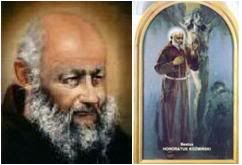 BLESSED HONORATUS KOZMINSKI (Poland, 1825-1916)
BLESSED HONORATUS KOZMINSKI (Poland, 1825-1916)
Capuchin, Founder of Congregations, Writer
Imprisoned as a teenager for allegedly taking part in a rebellion conspiracy,
he joined the Capuchins, and as a priest in Warsaw, devoted himself to
preaching, confessions, spiritual direction and working with lay Franciscans.
At age 30, he helped Blessed Angela Truszkowska establish the Felician
congregation. In 1864, Polish orders were suppressed after an assassination
plot on the Russian czar, and the clergy were expelled from Warsaw. Exiled
to another city, Zakroczym, he established 26 male and female congregations
who took vows but did not wear habits and lived among the people (17 still exist
today as secular institutes). His life was also marked by extensive writings,
particularly his sermons and letters, and 52 publications on ascetic theology.
In 1895, he was named Commissary-General for the Capuchins of Poland, but
in 1908, diocesan bishops took control over his congregations, whom he told
to obey. A contemporary said of him, "He always walked with God". He was
beatified in 1988.
OR today.
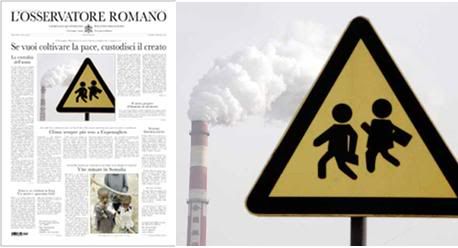
Benedict XVI's message for the 2010 World Day of Peace:
'If you wish to cultivate peace, safeguard Creation!'
Other Page 1 stories: The Holy Father's Motu Proprio making a few changes in canon
law provisions on deacons and marriage. International news: Increasing tension at
climate-change conference in Copenhagen, as the US and China head for a showdown;
new terrorist attacks in Iraq on Christians in Mosul and headquarters of international
organizations in Baghdad; and increasing threats to civilian lives from Muslim rebels
in Somalia.
THE POPE'S DAY
General Audience - The Holy Father's catechesis was on John of Salisbury, a 12th century English monk.
|
| |
 16/12/2009 16:45 16/12/2009 16:45 |
|
| | | OFFLINE | | Post: 19.092
Post: 1.738 | Registrato il: 28/08/2005
Registrato il: 20/01/2009 | Administratore | Utente Veteran | |
|
 GENERAL AUDIENCE TODAY
GENERAL AUDIENCE TODAY
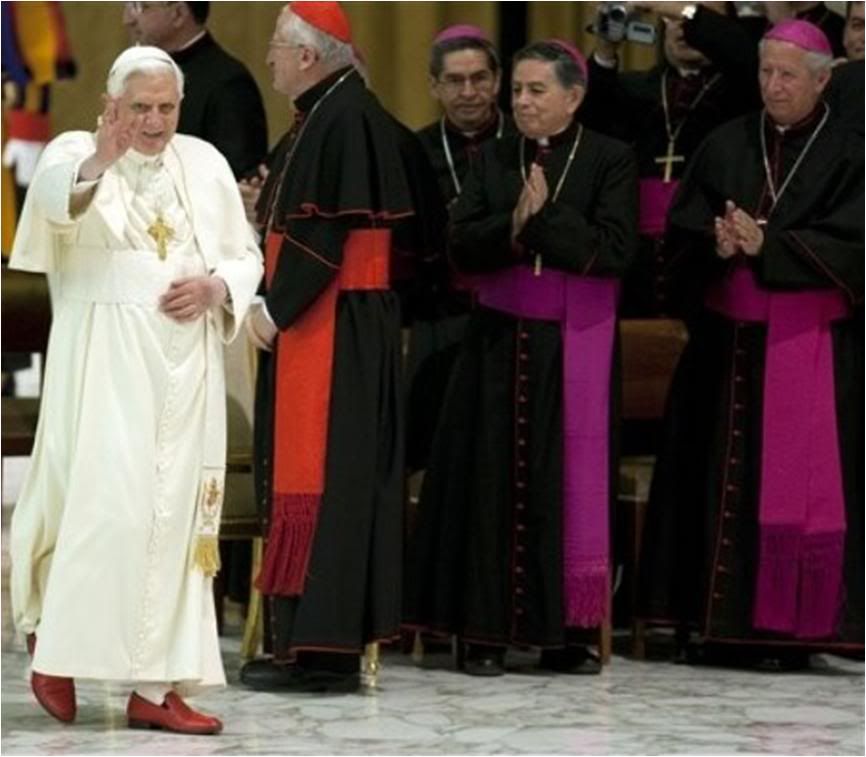
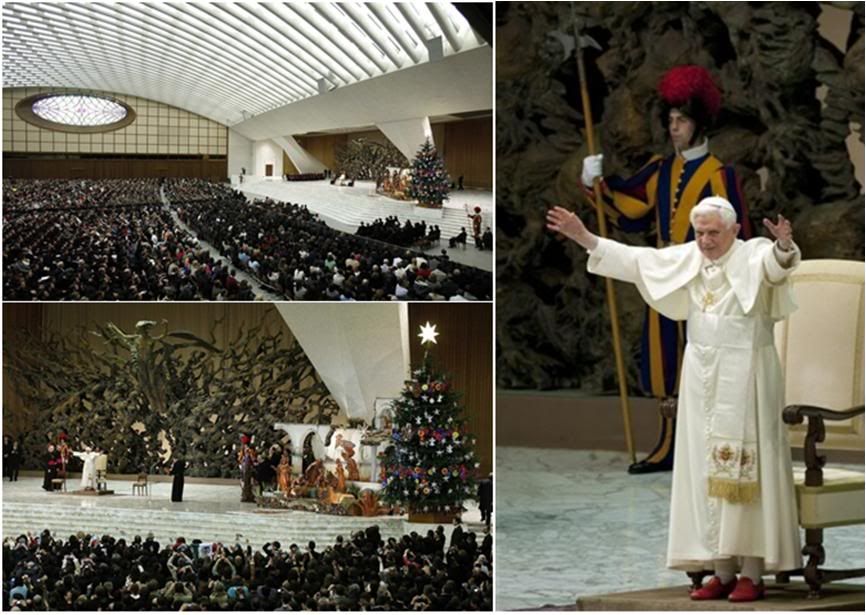
Continuing his catechetical cycle on the great Christian writers of the Middle Ages, the Holy Father spoke today on John of Salisbury, a 12th century English monk,
Here is how the Holy Father synthesized the lesson in English:
In our catechesis on the Christian culture of the Middle Ages, we now turn to John of Salisbury, an outstanding philosopher and theologian of the twelfth century.
Born in England, John was educated in Paris and Chartres. A close associate of Saint Thomas Becket, he was involved in the crisis between the Church and the Crown under King Henry II, and died as Bishop of Chartres.
In his celebrated work, the Metalogicon, John teaches that authentic philosophy is by nature communicative: it bears fruit in a message of wisdom which serves the building up of society in truth and goodness.
While acknowledging the limitations of human reason, John insists that it can attain to the truth through dialogue and argumentation. Faith, which grants a share in God’s perfect knowledge, helps reason to realize its full potential.
In another work, the Policraticus, John defends reason’s capacity to know the objective truth underlying the universal natural law, and its obligation to embody that law in all positive legislation.
John’s insights are most timely today, in light of the threats to human life and dignity posed by legislation inspired more by the "dictatorship of relativism" than by the sober use of right reason and concern for the principles of truth and justice inscribed in the natural law.
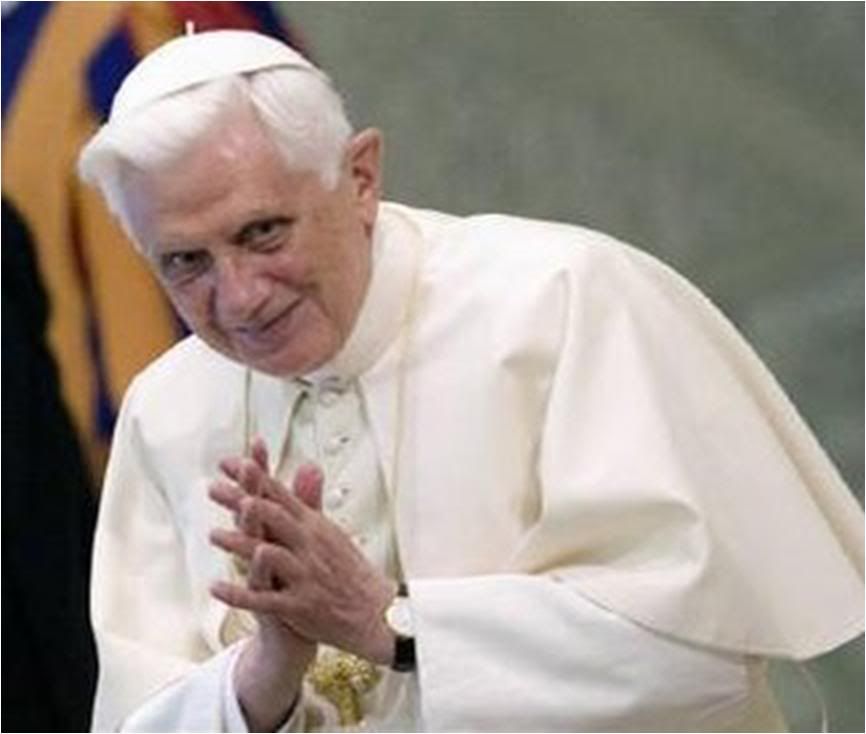
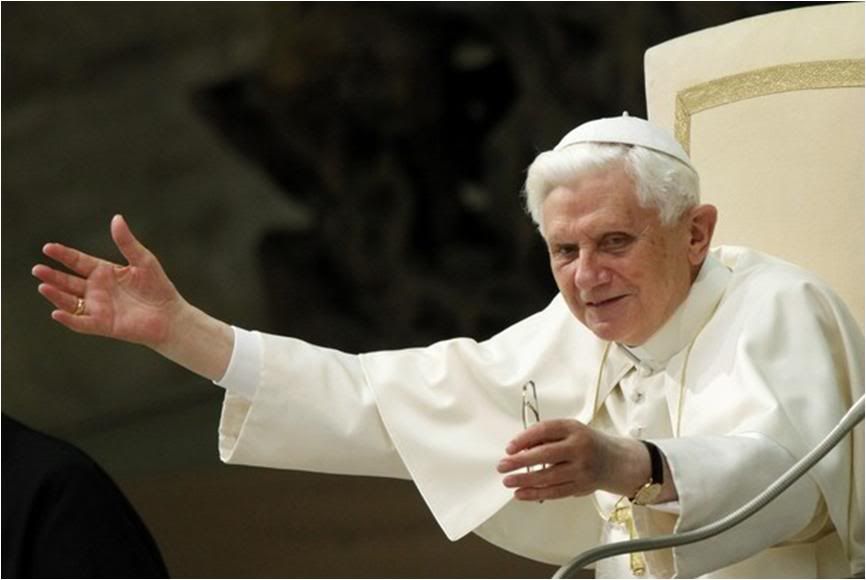
Here is a full translation of the Pope's catechesis:
Dear brothers and sisters,
Today we will come to know the figure of John of Salisbury who belonged to one of the most important philosophical and theological schools of the twelfth century - that of the Cathedral of Chartres, in France.
Like the theologians I have spoken of in the past weeks, he too helps us to understand how faith, in harmony with the just aspirations of reason, can propel the mind towards revealed truth in which man finds his true good.
John was born in Salisbury, England, some time between 100 and 1120. Reading his works, especially his rich epistolary, we are able to learn some of the most important facts of his life.
For almost 12 years, from 1136 to 1148, he dedicated himself to study, attending the most qualified schools of the day, listening to famous teachers. He went to Paris and then to Chartres, the environment that marked his formation the most, and from which he assimilated his great cultural openness, his interest for speculative problems and his appreciation of literature.
As it often happened in those days, the most brilliant students were asked by prelates and sovereigns to become their close collaborators. This was the case with John of Salisbury, who was presented by his great friend, Bernard of Clairvaux, to Theobald, Archbishop of Canterbury - the primate See of England - who gladly welcomed John to his clergy.
For eleven years, from 1150 to 1161, John was secretary and chaplain to the aging Theobald. With indefatigable zeal, even as he continued to devote himself to study, he also carried out intense diplomatic activity, going to Italy ten times for the specific purpose of tending to the relations of the Kingdom and the Church in England with the Roman Pontiff.
In those years, the Pope was Adrian IV, an Englishman who had a close friendship with John. In the years following Adrian IV's death in 1159, great tension arose in England between the Kingdom and the Church.
In fact, Henry II intended to affirm his authority over the internal life of the Church, limiting its freedom. This roused reaction from John of Salisbury, and especially, the courageous resistance of Theobald's successor as Archbishop, St. Thomas Becket, who was exiled to France for this reason.
John of Salisbury accompanied him to exile and remained in his service, while always working for a reconciliation [with the King].
In 1170 when both Becket and John had returned to England, Becket was assaulted and murdered in his own cathedral. He died a martyr and was always venerated as such by his people.
John continued to serve Becket's successor faithfully, until he was elected Bishop of Chartres, where he served from 1176 to his death in 1180.
Of the works of John of Salisbury, I wish to single out the two which are considered his masterpieces, with elegant Greek titles - Metaloghicón (In defense of logic) and Polycráticus (The man of government).
in the first book, not without the subtle irony that characterizes many men of culture, he rejected the position of those who had a reductive idea of culture, which they considered as empty eloquence, useless words.
John eulogizes culture as authentic philosophy - that is, the encounter between forceful thought and communication, effective words.
He wrote: "Indeed, just as the unenlightened eloquence of reason is not only fearsome but also blind, so wisdom that does not avail of the use of words is not just weak but in a certain way, lame. Indeed, even if wisdom without words can serve one's own conscience, it is rarely of use to society" (Metaloghicón 1,1, PL 199,327).
A very relevant teaching today. What John called 'eloquence' - the possiblity of communicating with instruments that are ever more developed and widespread - has multiplied enormously today.
Nonetheless, all the more urgent is the need to communicate messages endowed with 'knowledge', inspired by the truth, by goodness, by beauty.
This is a great responsibility, which particularly concerns persons who work in the multiform and complex field of culture, communications, the media. And it is a field in which the Gospel can be announced with missionary vigor.
In the Metaloghicón, John confronts the problems of logic, which were of great interest in his time, and asks a fundamental question: what exactly can human reason know? Up to what point can it correspond to the aspiration in every man to search for the truth?
John of Salisbury takes a moderate position, based on the teachings in some treatises of Aristotle and of Cicero. According to him, human reason generally arrives at knowledge that is not indisputable but probable and opinable.
He concludes that human reason is imperfect because it is subject to finiteness, to the limits of man. However, it grows and improves itself through experience and the elaboration of correct and coherent reasoning that is capable of establishing a relationship between concept and reality, by discussion, confrontation, and the enrichment of knowledge from generation to generation.
Only God has perfect knowledge which he communicates to man, at least partially, through Revelation that is received in faith, and for which the science of the faith - theology - displays the potential of reason and humbly causes it to advance in the knowledge of the mysteries of God.
The believer and the theologian, who explore the depths of the treasury of faith, also open themselves to practical knowledge which guides daily activity, and therefore, to moral laws and the exercise of virtue.
John of Salisbury writes: "God's clemency has granted us his law, that establishes which things are useful for us to know, and tells us what is licit to be known of God and how much we may correctly investigate about him.... Indeed, this law makes the will of God explicit and clear, in order that each of us may know what we need to do" (Metaloghicón 4,41, PL 199,944-945).
But John says there also exists an objective immutable truth, which originates in God, which is accessible to human reason and concerns man's practical and social actions. This is a human right, he says, which should inspire human laws as well as political and religious authorities so that they can promote the common good.
This natural law is characterized by a property that John calls 'equity', namely, the attribution of rights to every person. This gives rise to precepts that are legitimate for all peoples and that cannot be abrogated in any case.
That is the central thesis of the Polycraticus, John's treatise on political philosophy and theology, in which he reflects on the conditions that make the actions of those who govern just and permissible.
While other arguments in these books are linked to the historical circumstances within which they were written, the subject of the relationship between natural law and a positive juridical order mediated by equity is still of great importance today.
in our time, in fact, and especially in some countries, we are witnessing a preoccupying separation between reason - which has the task of discovering the ethical values linked to human dignity, and freedom - which has the responsibility to accept and promote these values.
Perhaps John of Salisbury would remind us today that only those laws correspond to equity which protect the sacredness of human life and reject the licitness of abortion, euthanasia and dispassionate genetic experimentation, laws that respect the dignity of matrimony between a man and a woman, that inspire a correct secularity in the State - a secularity that would always include the protection of religious freedom - and which pursues subsidiarity and solidarity at the national and international levels.
Otherwise, what ends up being installed is what John of Salisbury calls 'the tyranny of princes' - as we say today, 'the dictatorship of relativism', a relativism which, as I pointed out a few years ago, "does not recognize anything as definitive and whose ultimate goal consists solely of one's own ego and desires" (Missa pro eligendo Romano Pontifice, Homily, April 18, 2005).
In my recent encyclical, Caritas in veritate, addressing all men of goodwill to commit themselves so that social and political action may never be detached from the objective truth about man and his dignity, I wrote:
"Truth, and the love which it reveals, cannot be produced: they can only be received as a gift. Their ultimate source is not, and cannot be, mankind, but only God, who is himself Truth and Love. This principle is extremely important for society and for development, since neither can be a purely human product; the vocation to development on the part of individuals and peoples is not based simply on human choice, but is an intrinsic part of a plan that is prior to us and constitutes for all of us a duty to be freely accepted" (No. 52).
This plan which came before us, this truth of being, is what we must seek and accept in order that justice may be born, but we can find it and accept it only with a heart, a will, and reason purified in the light of God.
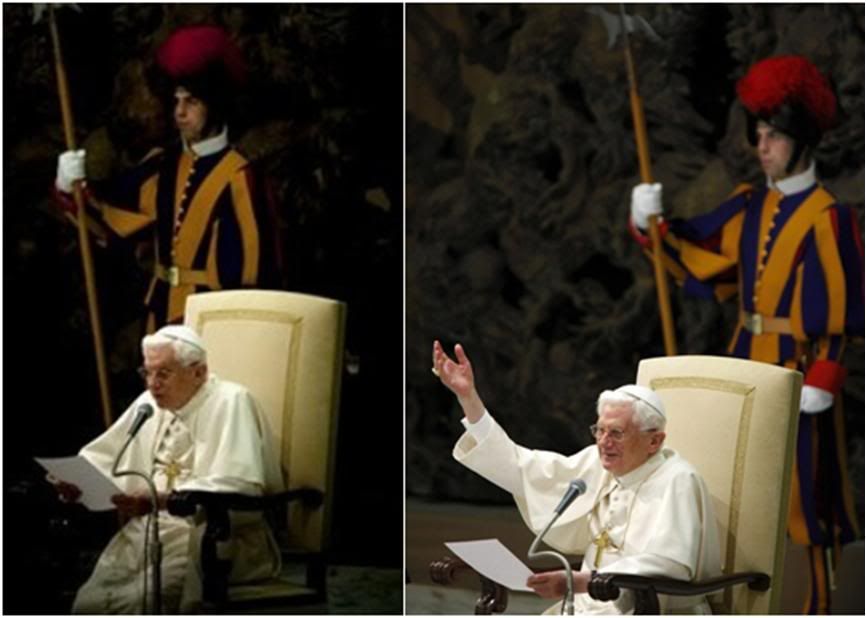
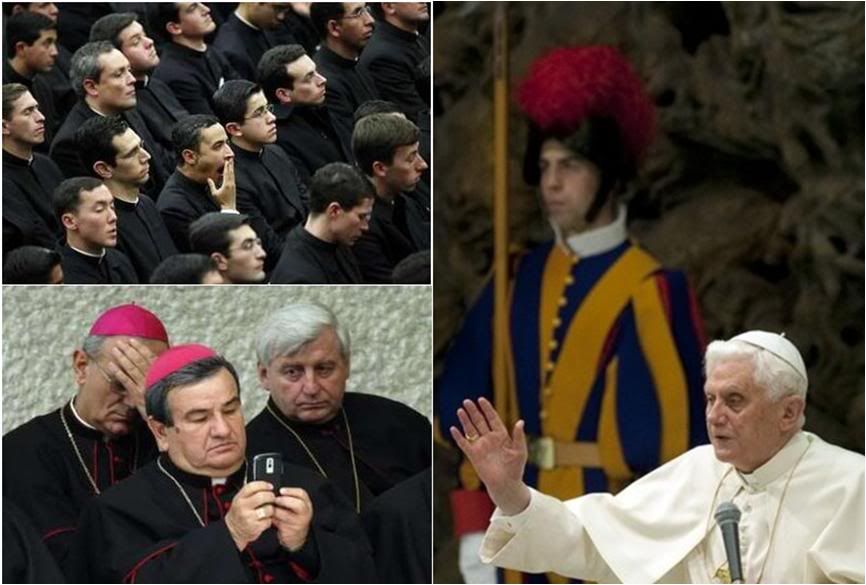
Two special events after today's audience were the formal presentation to the Holy Father by a delegation from Mexico of the creche for the Aula Paolo VI this year; and the Holy Father was formally made an honorary citizen of Introd, the commune in Val d'Aosta that has jurisdiction of the papal summer residence at Les Combes. where Benedict XVI has spent three of his five summer vacations as Pope.
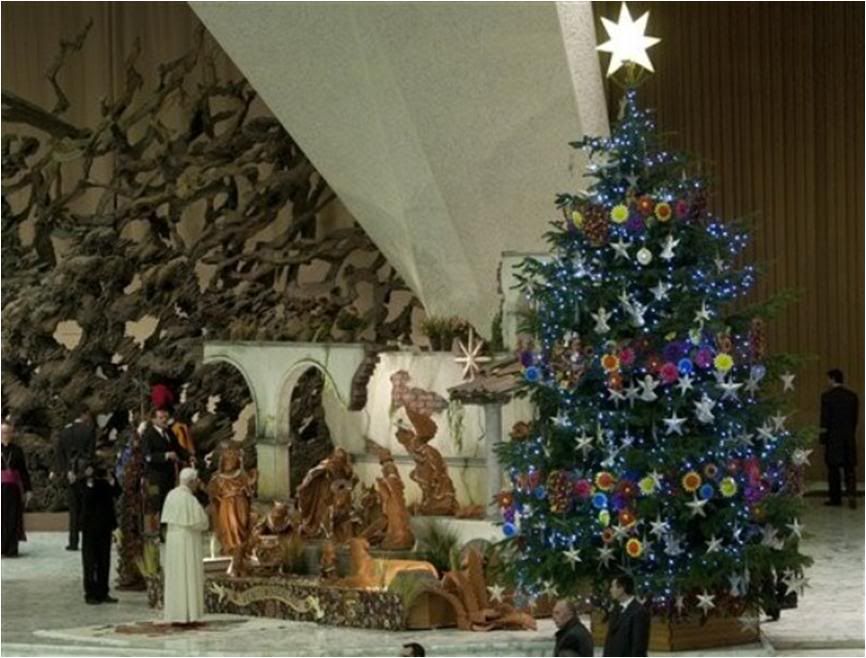 The statues were fashioned from limestone by Mexican artisans, with the angel figures in tin.
The statues were fashioned from limestone by Mexican artisans, with the angel figures in tin.
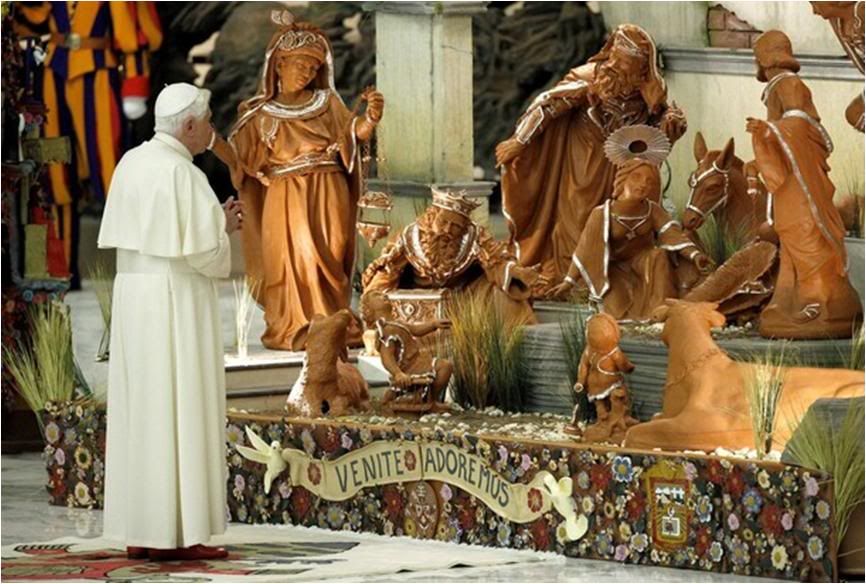

[Modificato da TERESA BENEDETTA 16/12/2009 19:59] |
| |
 16/12/2009 18:07 16/12/2009 18:07 |
|
| | | OFFLINE | | Post: 19.094
Post: 1.740 | Registrato il: 28/08/2005
Registrato il: 20/01/2009 | Administratore | Utente Veteran | |
|


 It has to be said - over and over, forcefully - and I am glad the editor of Asianews was quick to get to the point of the Holy Father's Message for the World Day of Peace in 2010. I'm looking today for other sane voices like his who will not distort the Pope's message for their own ideologically self-serving purposes.
The Pope on the environment:
It has to be said - over and over, forcefully - and I am glad the editor of Asianews was quick to get to the point of the Holy Father's Message for the World Day of Peace in 2010. I'm looking today for other sane voices like his who will not distort the Pope's message for their own ideologically self-serving purposes.
The Pope on the environment:
Urgent but not apocalyptic,
man-centered, not eco-centric -
a moral issue above everything
by Bernardo Cervellera
Editor

Vatican City , Dec. 15 (AsiaNews) - Benedict XVI's Message for World Day of Peace 2010, entitled "If you want cultivate peace, protect creation", was released just days before the conclusion of the Copenhagen conference on climate change.
But the Pope’s voice stands out from the chorus - sometimes not quite in agreement – of the voices expounding on the environment in recent days.
First, the concern of the Pope and the Church is urgent, but not apocalyptic, as we have used the distressing film or articles over the years.
He quotes from Paul VI in 1971 to show that the Church is concerned about the environment, even before it became fashionable or an economic interest.
Sure, some of Message's points may find agreement among participants in Copenhagen. The inter-generational solidarity (No. 8), for example, has been much emphasized at the meeting, with UN films and slogans urging concern for the climate in behalf of "future generations".
In Copenhagen, rich and poor nations are at each other's throats, with the developing nations demanding that the rich nations, which have caused much of air pollution so far, take more responsibility to pay the costs for poorer countries not just to offset development setbacks due to measure for cleaner energy but even for actual physical risks (small countries at sea level, who have been told they will soon be drowned by melting of the polar icecaps].
[And such apocalyptic hysteria is clearly wrong and counter-productive. You only need plain common sense to decide that an eco- and egocentric prophet of doom like Al Gore is clearly over the top when he says that 'unless something is done now, the polar icecaps will be gone in five years'!
First, before that can happen, the rest of the world would have fried to a crisp, and assuming that the phenomenon could happen in five years [something that historically takes eons], what could anyone possibly do to stop it in such a time frame?
Gore is not a stupid man, obviously, but his ecocentric obsessions have robbed him of all common sense and caused him to make increasingly preposterous claims and resort to outright lying about scientific data.
More scientists and world leaders are needed who can listen to Benedict XVI and speak out like him in rational, man-centered and pragmatic words about environmental protection. It is the middle way the world needs between the eco-obsessed, for whom the ultimate means to save the planet is to have less people on earth (Malthus revived in the ecological context), and those who airily dismiss legitimate concerns about manmade pollution and appear to advocate only minimal measures to curb it.]
But some themes of the message are absolutely unique and if heeded, could make really the UN conference in the Danish capital effective.
Benedict XVI said in fact that environmental care requires a conversion, a change in mentality: a change in lifestyles, making them more sober (No. 9); a change in our development model, all too often designed to "narrow economic interests "without care for creation (No. 7); experiencing solidarity "that is projected in space and time "(No. 8).
In a word: the problem of protecting the environment is a moral one. Thus, " humanity needs a profound cultural renewal; it needs to rediscover those values which can serve as the solid basis for building a brighter future for all.
Our present crises – be they economic, food-related, environmental or social – are ultimately also moral crises, and all of them are interrelated" (no. 5).
The moral issue is not just a matter of doctrine or of techniques: it comes from a deeper and truer conception of man and God. To the extent that the human person discovers "creation", God's work, then he also discovers that he must be a "guardian" and not "master" of creation, a careful cultivator and not blind "exploiter" of nature (see No. 6).
In Copenhagen the problem is this: on the one hand there is the search and the exaltation of any new technical solutions that often masks the economic interests of rich countries [they can make money from the poor countries by providing them with 'clean energy' technology]; and the other is the search for a 'ecological purity' in which both technology and man are 'excluded'.
In both cases, the missing factor [or at least, only minimal] is man and his individual responsibility (see No. 13).
Bjorn Lomborg, once a fierce environmentalist and now an 'ecological skeptic', fears that the conference in Copenhagen will be a failure: "They will promise once again to cut carbon emissions; good documents will be drawn up and signed, and then they won’t be applied”.
[But Lomborg was being totally unrealistic if he really expected Copenhagen would fare any better than Kyoto, the UN's previous flagship initiative for global environmental control. Ideology, which is always totalitarian in all senses when it holds sway, will never provide a workable or genuine solution. Calm reason and pragmatism are essential when devising global solutions.]
For the Pope, a true ecology must review certain sources of energy, concerning itself with water, forestry, waste disposal, farmers (No. 10), but above all, it must reaffirm an ‘authentic human ecology '... . [that of] the inviolability of human life at every stage and in every condition, the dignity of the person and the unique mission of the family, where one is trained in love of neighbour and respect for nature".
"Our duties towards the environment flow from our duties towards the person, considered both individually and in relation to others" (No.12)
This was the front-page editorial in L'Osservatore Romano today:
The centrality of man
Editorial
by Giovanni Maria Vian
Translated from
the 12/16/09 issue of

It is an effective motto for a message that must be read attentively.
The invitation to safeguard Creation in order to cultivate peace is not, in fact, the nth papal appeal in an ecological key, but rather a new reflection, in continuity with Christian tradition, which revolves around a most clear concept: the centrality of man, that is, the human being (man and woman), created by God in his image.
So even in environmental issues, ecocentrism and biocentrism must be rejected as visions that aim to absolutize the environment itself, and plant and animal life with it.
With the consequence of opening the way to 'a new pantheism with neo-pagan accents', which the papal document [message for the World Day of Peace, 2010] explicitly denounces.
At the core of the Pope's message is the Biblical narration of the origins of the world, with the commandment to cultivate and safeguard the earth and its resources.
It is a task entrusted to that creature whose centrality, notwithstanding original sin, shines forth in sacred Jewish and Christian texts, as synthesized in the second century by an expression of Irenaeus that was dear to Paul VI, identifying the glory of God - and therefore, his presence - in the living human being [ gloria Dei vivens homo).
Indeed, the psalmist asks the Lord: "What is man that thou art mindful of him?"
But the Pope's message also returns insistently to its unifying theme of man's responsibility for Creation. In continuity with the teaching of his predecessors - particularly of Paul VI in Populorum progressio and in Octogesima adveniens, and of John Paul II - Benedict XVI warns realistically that the inconsiderate exploitation of nature risks sweeping away man himself, a victim of such 'degradation'.
His analysis of the crisis, as in Caritas in veritate, is once again realistic when he evokes the 'environmental escapism', the economic and political myopia of many, but also the opportunity that the crisis itself holds out to change for the better, without indulging in unproven and, in any case, sterile catastrophism.
Thus the evocation of the theme of protecting Creation, with the very realistic invitation to "consider the cost entailed – environmentally and socially – as an essential part of the overall expenses incurred".
Finally and especially, the issue of responsibility towards the poorest and to future generations, with the exhortation for new lifestyles.
Because all Creation, illuminated by Christ, is a gift of God to the entire human family.
[Modificato da TERESA BENEDETTA 16/12/2009 20:39] |
| |
 17/12/2009 03:37 17/12/2009 03:37 |
|
| | | OFFLINE | | Post: 19.095
Post: 1.741 | Registrato il: 28/08/2005
Registrato il: 20/01/2009 | Administratore | Utente Veteran | |
|
 I hope this does not get as nasty as the business with Mons. Wagner in Austria earlier this year, though it has the potential to be worse. The regionalist-separatist political sentiment among the Basques apparently extends even to their clergy.
Basque priests reject bishop
I hope this does not get as nasty as the business with Mons. Wagner in Austria earlier this year, though it has the potential to be worse. The regionalist-separatist political sentiment among the Basques apparently extends even to their clergy.
Basque priests reject bishop
appointed by the Pope

 The Basques call their region Euskal-Herria, in Spain's northeastern corner. The third map shows the dioceses of Spain, with the Dioceses of St. Sebastian and Bilbao encircled.
The Basques call their region Euskal-Herria, in Spain's northeastern corner. The third map shows the dioceses of Spain, with the Dioceses of St. Sebastian and Bilbao encircled.
Madrid, Dec. 16 (dpa) - Catholic priests in Spain's Basque region have taken the unusual step of criticizing Pope Benedict XVI's choice of bishop for San Sebastian, media reports said Wednesday.
Nearly 80 per cent of the priests in the diocese of the port city said Jose Ignacio Munilla, who is due to become bishop in January, was not 'suitable' for the post.
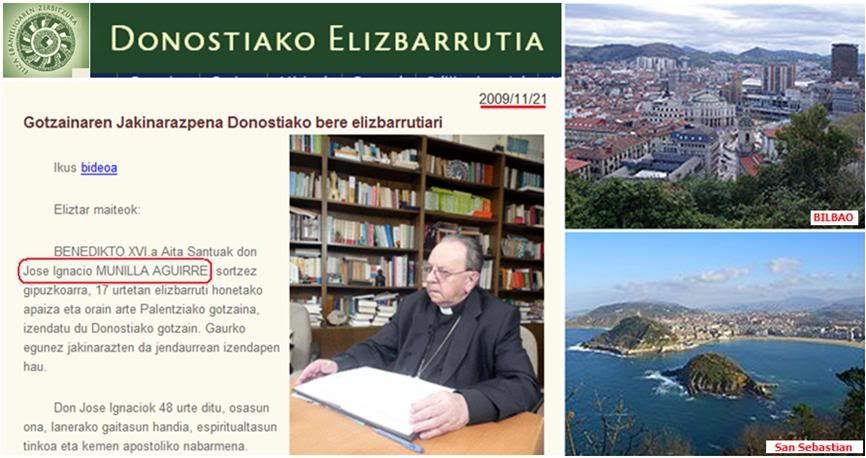 The news item announcing Mons. Munilla's appointment last November from the webpage of the Basque dioceses, but I do not see the protest manifesto against him posted anywhere for now.
The news item announcing Mons. Munilla's appointment last November from the webpage of the Basque dioceses, but I do not see the protest manifesto against him posted anywhere for now.
The priests issued a manifesto describing the choice of Munilla as 'discrediting the ecclesiastical life of our diocese.' [In what way? Unless Munilla has had a bad record as a priest, or has been appointed over a much more qualified Basque priest.]
The protest, which was described as unprecedented in the recent history of Spain's Catholic Church, was believed to have a political background.
The Basque church is known as being relatively progressive and sympathetic to the Basque nationalist movement, which contains separatist currents.
Munilla, on the other hand, is known as being close to the conservative line of Madrid Cardinal Antonio Maria Rouco, head of the Spanish bishops' conference, who was believed to have recommended him to the Pope.
[Of course, the recommendations of local bishops carry weight, because the candidates' list for a bishop's post comes from them to begin with. But is it not part of the job of the Congregation for Bishops, through the Nuncio in Spain and perhaps their own 'scouts', to investigate not just the candidate's background but also how his appointment might be taken by the diocese to which he is assigned? Particularly in a place with the tinderbox potential of the Basque country? If the Congregation and the Secretariat of State fail to do their prepping right (as in the case of Mons. Wielgus in Poland), it reflects badly and, ultimately, only on the Pope, and that's not fair to him.]
'A part of the Basque church has shown more sympathy for the killers (of the violent separatist group ETA) than for their victims,' the daily El Mundo charged. [But they would not be 'victims' if they had not performed terrorist acts to begin with!]
|
| |
|
|
|
|